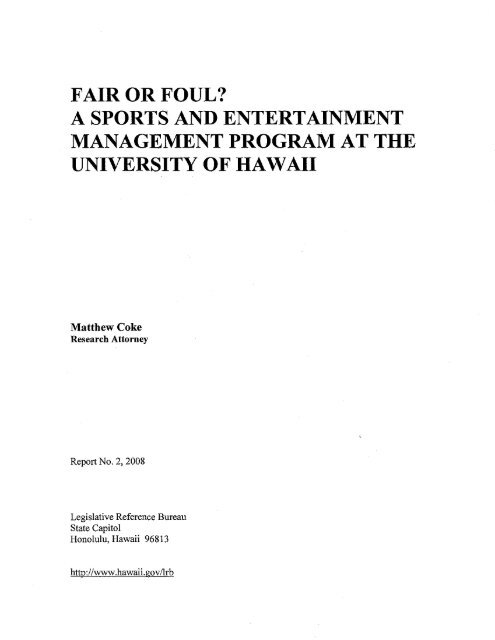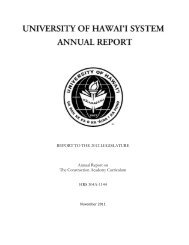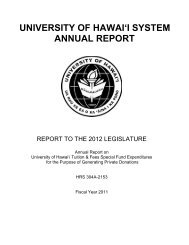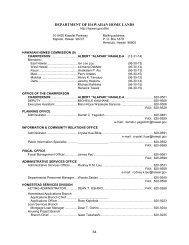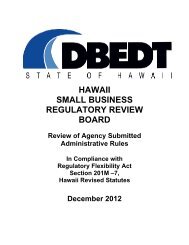Fair or Foul? - Legislative Reference Bureau
Fair or Foul? - Legislative Reference Bureau
Fair or Foul? - Legislative Reference Bureau
You also want an ePaper? Increase the reach of your titles
YUMPU automatically turns print PDFs into web optimized ePapers that Google loves.
FAIR OR FOUL?<br />
A SPORTS AND ENTERTAINMENT<br />
MANAGEMENT PROGRAM AT THE<br />
UNIVERSITY OF HAWAII<br />
Matthew Coke<br />
Research Att<strong>or</strong>ney<br />
Rep<strong>or</strong>t No.2, 2008<br />
<strong>Legislative</strong> <strong>Reference</strong> <strong>Bureau</strong><br />
State Capitol<br />
Honolulu, Hawaii 96813<br />
http://www.hawaii.gov/lrb
This rep<strong>or</strong>t has been cataloged as follows:<br />
Coke, Matthew<br />
<strong>Fair</strong> <strong>or</strong> foul? A sp<strong>or</strong>ts and entertainment management program at the University of<br />
Hawaii. Honolulu, HI: <strong>Legislative</strong> <strong>Reference</strong> <strong>Bureau</strong>, December 2008.<br />
1. Sp<strong>or</strong>ts - Management - Hawaii. 2. Entertainment events - Management - Hawaii.<br />
3. University of Hawaii (System).<br />
KFH421.5.L35 A25 08-2
FOREWORD<br />
This study was prepared in response to Senate Concurrent Resolution No. 70 (2008). The<br />
Concurrent Resolution requested the <strong>Legislative</strong> <strong>Reference</strong> <strong>Bureau</strong> to study: (1) the feasibility<br />
and advisability of establishing a certificate <strong>or</strong> degree program in sp<strong>or</strong>ts and entertainment<br />
management within the University of Hawaii; (2) other universities' sp<strong>or</strong>ts and entertainment<br />
management programs; (3) the economic and non-economic benefits to the State of a sp<strong>or</strong>ts and<br />
entertainment management program; and (4) the feasibility of creating w<strong>or</strong>kshop and seminar<br />
programs here in Hawaii f<strong>or</strong> professionals in the sp<strong>or</strong>ts and entertainment industries.<br />
The <strong>Bureau</strong> extends its appreciation to the faculty and administration of the University of<br />
Hawaii, the staff of the Department of Business, Economic Development, and Tourism, the staff<br />
of the Hawaii Film Office, the staff of the Hawaii Tourism Auth<strong>or</strong>ity, the faculty and<br />
administration at various universities that were contacted f<strong>or</strong> this study, the members of Hawaii's<br />
sp<strong>or</strong>ts and entertainment community who offered inf<strong>or</strong>mation and ideas, and to various other<br />
professionals who assisted the <strong>Bureau</strong> in this study.<br />
December 2008<br />
iii<br />
Ken H. Takayama<br />
Direct<strong>or</strong>
TABLE OF CONTENTS<br />
Page<br />
FOREWORD............................................................................................................. iii<br />
FACT SHEET............................................................................................................ vi<br />
1. SCOPE OF THE STUDY. ............................................................................ . 1<br />
2. SPORTS IN HAWAII .................................................................................. . 2<br />
3. UNIVERSITY SPORTS AND ENTERTAINMENT<br />
MANAGEMENT PROGRAMS .................................................................. . 5<br />
A. Summary of Programs Nationwide ...................................................... 5<br />
B. Arizona State University, W.P. Carey School of Business .................. 6<br />
C. University of South Carolina ...... .... ... ... ... .......... .... ... ... ........ .... ... ... ... .... 7<br />
D. University ofNevada--Las Vegas ........................................................ 9<br />
4. FEASIBILITY OF SPORTS AND ENTERTAINMENT<br />
MANAGEMENT PROGRAM WITHIN THE<br />
UNIVERSITY OF HAWAII AND ALTERNATIVES ................................ 10<br />
A. Undergraduate <strong>or</strong> Graduate Degree...................................................... 10<br />
B. Other Options at the University of Hawaii........................................... 12<br />
1. Certificate in Sp<strong>or</strong>ts and Entertainment Management.. .... ..... ...... 12<br />
2. Cooperative Program ............................................... :................... 13<br />
3. Professional Golf Management ................................................... 14<br />
5. ECONOMIC AND NON-ECONOMIC EFFECTS OF A SPORTS<br />
AND ENTERTAINMENT MANAGEMENT PROGRAM AT<br />
THE UNIVERSITY OF HAWAII ................................................................ 17<br />
6. CREATING PROFESSIONAL EDUCATION PROGRAMS ..................... 20<br />
7. SUMMARY AND CONCLUSIONS............................................................ 21<br />
Summary........................................................................................................ 21<br />
Conclusions ...... ..... ... .... .......... ..... ... ... ..... ........ ... .... ... ... .... ... ... ..... ......... ... ....... 22<br />
iv
1.<br />
2.<br />
3.<br />
Tables<br />
Estimated Economic Impact of Selected Maj<strong>or</strong> Sp<strong>or</strong>ting<br />
Events in Hawaii ........................................................................................... .<br />
Sp<strong>or</strong>ts-related Tourism in Hawaii ................................................................. .<br />
Number of U.S. Colleges with Sp<strong>or</strong>ts Management Programs .................... .<br />
Appendices<br />
A. Senate Concurrent Resolution No. 70, Hawaii State Legislature,<br />
Regular Session of 2008, Requesting a Study on the Feasibility of<br />
Establishing a Degree Program f<strong>or</strong> Sp<strong>or</strong>ts and Entertainment<br />
Management at the University of Hawaii ...................................................... 27<br />
B. Breakdown by Visit<strong>or</strong>s to Hawaii from Maj<strong>or</strong> Market Areas;<br />
DBEDT/READ 2007 Visit<strong>or</strong> Satisfaction and Activities Survey................. 30<br />
C. Primary and Secondary Purpose of Trip;<br />
DBEDT 2006 Visit<strong>or</strong> Satisfaction and Activity Rep<strong>or</strong>t ................................ 31<br />
D. Listing ofInstitutions and Type of Degrees Offered;<br />
N<strong>or</strong>th American Society f<strong>or</strong> Sp<strong>or</strong>ts Management ......................................... 32<br />
E. Sp<strong>or</strong>ts Management Degree Requirements;<br />
Ge<strong>or</strong>ge Mason University.............................................................................. 36<br />
F. Graduate Sp<strong>or</strong>t Management Program; Old Dominion University,<br />
Darden College of Education ........................................................................ 39<br />
G. Program and Specific Curriculum; W.P. Carey MBA;<br />
Sp<strong>or</strong>ts Business Program. ... ... ...... ............ ........ ... ... ... ... ... ...... ... ... ... ........ ... ..... 40<br />
H. University of South Carolina; Sp<strong>or</strong>ts and Entertainment<br />
Management Undergraduate Degree Requirements...................................... 46<br />
L University of South Carolina; Sp<strong>or</strong>ts and Entertainment<br />
Management Graduate Program.... .... ..... ... ..... ... ... ... ... ... ... ..... .... ..... ... ... ...... ... 48<br />
v<br />
Page<br />
3<br />
3<br />
5
FACT SHEET<br />
• Currently, only 1.8% to 3.1 % of visit<strong>or</strong>s to Hawaii rep<strong>or</strong>t a sp<strong>or</strong>ting event as a primary <strong>or</strong><br />
secondary purpose f<strong>or</strong> their trip.<br />
• A sp<strong>or</strong>ts and entertainment management degree program at the University of Hawaii would<br />
compete against m<strong>or</strong>e than 236 sp<strong>or</strong>ts management programs at universities nationwide.<br />
• Undergraduate sp<strong>or</strong>ts management degree programs generally require students to complete<br />
general education courses along with specialized sp<strong>or</strong>ts business and management courses<br />
and an internship. Master's degree programs tend to require specialized sp<strong>or</strong>ts business and<br />
management programs and an internship. Sp<strong>or</strong>ts business M.B.A. programs generally<br />
require the completion of c<strong>or</strong>e business programs, followed by specialized sp<strong>or</strong>ts business<br />
courses.<br />
• There are high costs associated with starting and operating a sp<strong>or</strong>ts and entertainment<br />
management degree program at University of Hawaii, and the economic and non-economic<br />
benefits of a sp<strong>or</strong>ts and entertainment management degree program are unknown.<br />
• There appears to be little demand among students at the University of Hawaii f<strong>or</strong> a sp<strong>or</strong>ts and<br />
entertainment management degree program.<br />
• There is no demand f<strong>or</strong> a sp<strong>or</strong>ts and entertainment management degree program among the<br />
administrations at the Shidler College of Business, Travel Industry Management School, <strong>or</strong><br />
the College of Education at University at Manoa.<br />
• The administrations of the University of Hawaii-West Oahu and University of Hawaii-Hilo<br />
have rejected proposals f<strong>or</strong> a sp<strong>or</strong>ts and entertainment management degree program in the<br />
past, but remain open to the possibility in the future when and if sufficient funds may be<br />
available.<br />
• Opinions vary among sp<strong>or</strong>ts and entertainment business professionals in Hawaii on the need<br />
f<strong>or</strong> a sp<strong>or</strong>ts and entertainment management degree program at University of Hawaii.<br />
• Possible alternatives to a sp<strong>or</strong>ts and entertainment management degree program include a<br />
sp<strong>or</strong>ts management certificate program <strong>or</strong> a joint program between a University of Hawaii<br />
community college and another university that already has an established sp<strong>or</strong>ts management<br />
program.<br />
• A golf management program may be a feasible alternative in the future when and if sufficient<br />
funds are available. Such a program may provide benefits to Hawaii's golf tourism market.<br />
• There are limited job opp<strong>or</strong>tunities in sp<strong>or</strong>ts management and sp<strong>or</strong>ts business throughout the<br />
United States, and there is no evidence that the creation alone of a sp<strong>or</strong>ts and entertainment<br />
management degree program will c<strong>or</strong>relate to the creation of new sp<strong>or</strong>ts and entertainment<br />
management jobs in the State.<br />
• Limited professional education programs in sp<strong>or</strong>ts business have already taken place in<br />
Hawaii, and possibilities exist f<strong>or</strong> them to continue.<br />
vi
Chapter 1<br />
SCOPE OF THE STUDY<br />
This study was prepared in response to Senate Concurrent Resolution No. 70 (2008)<br />
(copy attached as Appendix A). The Concurrent Resolution requested the <strong>Legislative</strong> <strong>Reference</strong><br />
<strong>Bureau</strong> to study: (I) the feasibility and advisability of establishing a certificate <strong>or</strong> degree<br />
program in sp<strong>or</strong>ts and entertainment management within the University of Hawaii; (2) other<br />
universities' sp<strong>or</strong>ts and entertainment management programs; (3) the ec<strong>or</strong>iomic and noneconomic<br />
benefits to the State of a sp<strong>or</strong>ts and entertainment management program; and (4) the<br />
feasibility of creating w<strong>or</strong>kshop and seminar programs here in Hawaii f<strong>or</strong> professionals in the<br />
sp<strong>or</strong>ts and entertainment industries.<br />
The primary focus of this study is to examine the feasibility of establishing a program to<br />
educate students in the University of Hawaii System in the business and management of largescale,<br />
live sp<strong>or</strong>ts and entertainment events. Senate Concurrent· Resolution No. 70 (2008)<br />
specifically requested researching the sp<strong>or</strong>ts and entertainment management program at the<br />
University of South Carolina. During an interview conducted in preparation f<strong>or</strong> this study, the<br />
direct<strong>or</strong> of University of South Carolina's program suggested that, although many colleges'<br />
programs focus solely on sp<strong>or</strong>ts management, the focus of the University of South Carolina's<br />
program is preparing students f<strong>or</strong> the business and management of large-scale live events,<br />
regardless of whether they are sp<strong>or</strong>t <strong>or</strong> other entertainment venues. He noted that large live<br />
spectat<strong>or</strong> events share so many common similarities and challenges that there is no emphasis on<br />
one type of event over the other. l<br />
The study also takes a look at features of sp<strong>or</strong>ts management <strong>or</strong> sp<strong>or</strong>ts and entertainment<br />
management curriculnms at other colleges around the country. The study briefly expl<strong>or</strong>es<br />
several possible alternatives to a sp<strong>or</strong>ts and entertainment management degree program at the<br />
University of Hawaii. This study also examines the economic and non-economic benefits of<br />
establishing a sp<strong>or</strong>ts and entertainment management degree program at the University of Hawaii.<br />
Finally, this study expl<strong>or</strong>es the feasibility of options f<strong>or</strong> professional education in sp<strong>or</strong>ts and<br />
entertainment event management.<br />
1 Telephone interview with Frank Roach, Department Chair, Sp<strong>or</strong>t and Entertainment Management, University of<br />
South Carolina (June 30, 2008).<br />
I
Chapter 2<br />
SPORTS IN HAWAII<br />
Sp<strong>or</strong>ts and entertainment management includes the planning, <strong>or</strong>ganizing, implementing,<br />
and controlling of sp<strong>or</strong>ts <strong>or</strong> entertainment projects in a manner that accomplishes the goals of the<br />
event, in most cases, revenue generation. The management of sp<strong>or</strong>ts and entertainment events <strong>or</strong><br />
<strong>or</strong>ganizations involves basic management principles, such as business inf<strong>or</strong>mation management,<br />
financial management, production management, marketing management, and human resources<br />
management, as applied to the specialized businesses of sp<strong>or</strong>ts and entertainment. 1 In 2007,<br />
sp<strong>or</strong>ts business was a $213 billion industry in the United States. In addition to spectat<strong>or</strong> fees, the<br />
sp<strong>or</strong>ts business industry generates revenues in a variety of other areas, including advertising,<br />
end<strong>or</strong>sements, media broadcast rights, and licensing. 2<br />
Hawaii hosts a limited number oflarge sp<strong>or</strong>ting events each year. In 2007, the Honolulu<br />
Marathon resulted in a $108.8 million impact to the State's economy.3 The National Football<br />
League's Pro-Bowl, held in Hawaii each February, brought $28.03 million in visit<strong>or</strong> spending to<br />
the State in 2007. 4 The Van's Triple Crown of Surfing series of surf contests generated $14.6<br />
million of economic activity in 2007. 5 The 2007 Sheraton Hawaii Bowl generated<br />
approximately $18 million in visit<strong>or</strong> spending. 6 The X-Terra W<strong>or</strong>ld Championship, an off-road<br />
triathlon held on Maui each year, had an economic impact of approximately $2.5 million in<br />
2007. 7 The F<strong>or</strong>d Ironman W<strong>or</strong>ld Championship held on the Big Island each fall brings in<br />
approximately $25.9 million annually in visit<strong>or</strong> spending. 8 The EA Sp<strong>or</strong>ts Maui Invitational<br />
I K. Kaser and J. Brooks, SPORTS AND ENTERTAlNMENTMANAGEMENT at 4-10 (2005).<br />
2 Street and Smith's Sp<strong>or</strong>ts Business Journal. (last visited August 22,2008).<br />
3 Tsai, M., Marathon Gives $J08.89M Boost, Honolulu Advertiser (Mar. 4, 2008). (This represents an increase from<br />
2006's impact of $1 0 1.6 million. It is imp<strong>or</strong>tant to note that much of the Honolulu Marathon's impact is dependent<br />
on f<strong>or</strong>eigu visit<strong>or</strong> spending, due to the large number of f<strong>or</strong>eigu visit<strong>or</strong>s that participate in the race. The article<br />
rep<strong>or</strong>ts that the 2007 Honolulu Marathon had 27,827 participants, which included 17,056 participants from Japan,<br />
2,089 participants from the Mainland U.S., and 792 participants from other countries. In addition, 3,334, race-day<br />
walkers from Japan participated in the event.<br />
4 Dingeman, R., Pro Bowl Numbers Decline. Honolulu Advertiser. (Feb. 27, 2007). (It is imp<strong>or</strong>tant to note that<br />
there has been an annual decline in the number of visit<strong>or</strong>s and the amount of visit<strong>or</strong> spending surrounding the Pro<br />
Bowl since 2005. The future of the game in Hawaii is uncertain as the NFL's contract with the State to host the<br />
game expires in 2009.) See also, Tsai, M., Already Missing Pro Bowl, Honolulu Advertiser (Feb. 9, 2008) and Pro<br />
Bowl's Financial Clout Slips, Study Says, Honolulu Star-Bulletin (Feb. 27, 2008).<br />
5 Wiles, G., Sur/Contests Bring in $14.6M, Honolulu Advertiser (June 15,2007).<br />
6 Telephone interview with Michael St<strong>or</strong>y, Sp<strong>or</strong>ts Manager, Hawaii Tourism Auth<strong>or</strong>ity (Sept. 5, 2008). The<br />
economic impact of the Sheraton Hawaii Bowl tends to vary depending on whether <strong>or</strong> not the University of Hawaii<br />
is playing in the game. The 2007 Boise State University vs. East Carolina University game attracted m<strong>or</strong>e visit<strong>or</strong>s<br />
than usual because both teams were visiting. In 2006, the University of Hawaii vs. Arizona State University game<br />
generated about $11 million in visit<strong>or</strong> spending, ostensibly because fewer visit<strong>or</strong>s from out-of-state attended the<br />
game.<br />
7 Telephone interview with Michael St<strong>or</strong>y, Sp<strong>or</strong>ts Manager, Hawaii Tourism Auth<strong>or</strong>ity (Sept. 5, 2008).<br />
8 E-mail c<strong>or</strong>respondence from Diana Bertsch, Event Direct<strong>or</strong>, F<strong>or</strong>d Ironman W<strong>or</strong>ld Championship (July 24, 2008).<br />
Ms. Bertsch estimates that approximately 15,000 visit<strong>or</strong>s come to Hawaii each year to attend <strong>or</strong> participate in the<br />
race. This number does not include the visit<strong>or</strong> spending attributable to the Ironman training camps held throughout<br />
the year <strong>or</strong> the qualifying race held each spring.<br />
2
SPORTS IN HAWAII<br />
college basketball tournament has an estimated economic impact each year of $8.5 million. 9<br />
Finally, several men's and women's professional golf tournaments are held around the State each<br />
year, which, combined, have an average economic impact of about $25 million. 1O<br />
Table 1. Estimated Economic Impact of<br />
Selected Maj<strong>or</strong> Sp<strong>or</strong>ting Events in Hawaii<br />
Event Estimated Impact ($m)<br />
Honolulu Marathon 108.8<br />
NFL Pro-Bowl 28.03<br />
Van's Triple Crown 14.6<br />
Sheraton Hawaii Bowl 18<br />
X-terra W<strong>or</strong>ld Championship 2.5<br />
F<strong>or</strong>d Ironman W<strong>or</strong>ld Championship 25.9<br />
EA Sp<strong>or</strong>ts Maui Invitational 8.5<br />
Professional golf tournaments (combined) 25<br />
F<strong>or</strong> the purposes of this study, we can evaluate the economic impact of maj<strong>or</strong> sp<strong>or</strong>ts<br />
events in Hawaii as measured by visit<strong>or</strong> impacts, that is, the amount of spending and revenue<br />
generated in the State by visit<strong>or</strong>s here f<strong>or</strong> the sp<strong>or</strong>ting event.<br />
Based on data collected by the Department of Business, Economic Development, and<br />
Tourism, the number of visit<strong>or</strong>s to Hawaii that rep<strong>or</strong>t a sp<strong>or</strong>ting event as their primary purpose<br />
f<strong>or</strong> visiting the State makes up a small percentage of total visit<strong>or</strong>s, as shown in Table 2. In 2006<br />
and 2007, just 1.8% of visit<strong>or</strong>s to Hawaii rep<strong>or</strong>ted coming specifically to attend <strong>or</strong> participate in<br />
a sp<strong>or</strong>ts event. 11 This refresents a slight decline from 2005, when 2.0% of visit<strong>or</strong>s rep<strong>or</strong>ted<br />
coming f<strong>or</strong> a sp<strong>or</strong>ts event. 2 Currently, 2008 projections show a further decline, with only 1.6%<br />
of visit<strong>or</strong>s arriving f<strong>or</strong> a sp<strong>or</strong>ts event. 13<br />
Table 2. Sp<strong>or</strong>ts Related Tourism in Hawaii<br />
2008p<br />
2005 2006 2007 (Jan.-Aug.)<br />
Total Visit<strong>or</strong>s 7,416,574 7,461,299 7,496,820 5,169,845<br />
Sp<strong>or</strong>ts Events 146,877 133,689 133,214 81,504<br />
% of Total 2.0% 1.8% 1.8% 1.6%<br />
Source: Hawaii Department of Business, Economic Development, and Tourism.<br />
9 Telephone interview with Michael St<strong>or</strong>y, Sp<strong>or</strong>ts Manager, Hawaii Tourism Auth<strong>or</strong>ity (Sept. 5, 2008).<br />
10 Telephone interview with Michael St<strong>or</strong>y, Sp<strong>or</strong>ts Manager, Hawaii Tourism Auth<strong>or</strong>ity (Sept. 19,2008). Hawaii<br />
has traditionally been the site of the PGA Tour Sony Open, the PGA Tour Mercedes-Benz Championship, the<br />
Cbampions Tour MasterCard Championship, the Champions Tour Turtle Bay Championship, the PGA of America<br />
Wendy's Champions Skins Game, the LPGA SBS Open, and the LPGA Kapalua Classic. It should be noted,<br />
though, that the Turtle Bay Championship will not be held here after 2007.<br />
11 Department of Business, Economic Development, and Tourism (hereafter DBEDT), DBEDT Annual Research<br />
Rep<strong>or</strong>t and Monthly Highlights Rep<strong>or</strong>t.<br />
12 Id.<br />
13Id.<br />
3
FAIR OR FOUL? A SPORTS AND ENTERTAINMENT MANAGEMENT PROGRAM<br />
AT THE UNIVERSITY OF HAWAII<br />
Broken down by visit<strong>or</strong>s to Hawaii from maj<strong>or</strong> market areas in 2007, 1.2% of visit<strong>or</strong>s<br />
from the mainland United States (1.3% from the U.S. West and 0.9% from the U.S. East), 3% of<br />
the visit<strong>or</strong>s from Japan, 1.2% of visit<strong>or</strong>s from Canada, and 1.8% of visit<strong>or</strong>s from Europe rep<strong>or</strong>ted<br />
a sp<strong>or</strong>ts event as their primary purpose f<strong>or</strong> visiting Hawaii. 14 (See Appendix B f<strong>or</strong> 2007 data.) It<br />
should also be noted that of all visit<strong>or</strong>s to Hawaii from these maj<strong>or</strong> market areas, 3.1 % rep<strong>or</strong>ted<br />
that attendance at a sp<strong>or</strong>ts event was a secondary purpose of their trip to Hawaii. 1s There appears<br />
to be no marked difference between the "primary purpose" data from 2007 and the previous year,<br />
however, the "secondary purpose" data from 2007 shows slight variations from 2006. 16 (See<br />
Appendix C f<strong>or</strong> 2006 data.)<br />
14 DBEDT 2007 Visit<strong>or</strong> Satisfaction and Activity Rep<strong>or</strong>t (draft awaiting publication). Data cited here is taken from<br />
the DBEDTIREAD 2007 Visit<strong>or</strong> Satisfaction and Activities Survey. The Visit<strong>or</strong> Satisfaction and Activities Survey<br />
relies on self-rep<strong>or</strong>ting by visit<strong>or</strong>s to the State. DBEDT interprets "primary purpose" responses to mean that those<br />
visit<strong>or</strong>s specifically planned their trip to Hawaii to engage in <strong>or</strong> attend the activity, in this case, a sp<strong>or</strong>ts event.<br />
DBEDT interprets "secondary purpose" responses to mean that those visit<strong>or</strong>s included the secondary activity in their<br />
trip planning in addition to the primary purpose f<strong>or</strong> the trip. F<strong>or</strong> example, a visit<strong>or</strong> who responds that a sp<strong>or</strong>ts event<br />
is a primary purpose f<strong>or</strong> their trip may have traveled to Hawaii specifically to play in <strong>or</strong> watch a sp<strong>or</strong>ts event. A<br />
visit<strong>or</strong> who responds that a sp<strong>or</strong>ts event is a secondary purpose f<strong>or</strong> their trip may have scheduled a vacation trip to<br />
Hawaii to coincide with a sp<strong>or</strong>ts event so that he <strong>or</strong> she could attend the event in addition to their primary purpose of<br />
vacationing.<br />
15Id Broken down by visit<strong>or</strong>s to Hawaii from maj<strong>or</strong> market areas in 2007, 2.9% of visit<strong>or</strong>s from the mainland<br />
United States (3.8% from the U.S. West and 1.5% from the U.S. East), 3.2% of visit<strong>or</strong>s from Japan, 5.1% of visit<strong>or</strong>s<br />
from Canada, and 4.3% of visit<strong>or</strong>s from Europe rep<strong>or</strong>ted a sp<strong>or</strong>ts event as a secondary purpose f<strong>or</strong> visiting Hawaii.<br />
16 DBEDT 2006 Visit<strong>or</strong> Satisfaction and Activity Rep<strong>or</strong>t, at 144 <br />
(last visited Oct. 21, 2008).<br />
4
Chapter 3<br />
UNIVERSITY SPORTS AND ENTERTAINMENT<br />
MANAGEMENT PROGRAMS<br />
A. Summary of Programs Nationwide<br />
The N<strong>or</strong>th American Society f<strong>or</strong> Sp<strong>or</strong>t Management indicates that 236 colleges and<br />
universities in the United States offer a degree program in sp<strong>or</strong>ts management. (See Appendix D<br />
f<strong>or</strong> a listing of institutions and type of degrees offered.) Among the programs that are available<br />
are undergraduate, master's, and doct<strong>or</strong>ate degrees in sp<strong>or</strong>ts management <strong>or</strong> sp<strong>or</strong>ts<br />
administration. Schools that offer sp<strong>or</strong>ts management degrees range from large public state<br />
universities to smaller regional and private colleges. l<br />
Table 3. Number of U.S. Colleges witb Sp<strong>or</strong>ts Management Programs<br />
Undergraduate only 107<br />
Graduate only (master's andl<strong>or</strong> doct<strong>or</strong>ate) 44<br />
Undergraduate and graduate 85<br />
Source: N<strong>or</strong>th American Society f<strong>or</strong> Sp<strong>or</strong>t Management.<br />
There is some slight variation among the types of sp<strong>or</strong>ts management programs that exist<br />
around the country. From the research prepared f<strong>or</strong> this study, most schools' programs tend to<br />
concentrate exclusively on sp<strong>or</strong>ts management, with a notable exception being the University of<br />
South Carolina, where the degree program has a broader focus on sp<strong>or</strong>ts and entertainment<br />
management. Also, it appears that universities tend to place their sp<strong>or</strong>ts management programs<br />
within a college of education, a college of travel and hospitality, <strong>or</strong> a business school. 2 A small<br />
number of universities offer an M.B.A. degree with a concentration in sp<strong>or</strong>ts business. By and<br />
large, undergraduate degrees in sp<strong>or</strong>ts management require completion of general education<br />
courses and specialized courses that focus on aspects of sp<strong>or</strong>ts and law, economics and<br />
financing, and management skills. Almost all undergraduate and graduate level programs appear<br />
to require an internship <strong>or</strong> practicum.<br />
Ge<strong>or</strong>ge Mason University offers a fairly standard example of an undergraduate sp<strong>or</strong>ts<br />
management curriculum. There, in addition to general education courses, undergraduate students<br />
1 N<strong>or</strong>th American Society f<strong>or</strong> Sp<strong>or</strong>ts Management (NASSM) < http://www.nassm.comJlnfoAbout/<br />
Sp<strong>or</strong>tMgmtProgramsfUnited States> (last visited July \, 2008). (It should be noted that Arizona State University,<br />
whose sp<strong>or</strong>ts business M.B.A. program is discussed later in this study, does not appear on NASSM's list of schools<br />
with sp<strong>or</strong>ts management programs. The reason f<strong>or</strong> this is unknown.)<br />
2 Many sp<strong>or</strong>ts management programs have traditionally been found in schools of education, but as the focus of<br />
sp<strong>or</strong>ts management programs has shifted from athletics administration to sp<strong>or</strong>ts business management, these<br />
programs increasingly are placed in schools of hospitality and tourism <strong>or</strong> in business schools where the curriculums<br />
could emphasize the development of business management, fmance, and marketing skills.<br />
5
FAIR OR FOUL? A SPORTS AND ENTERTAINMENT MANAGEMENT PROGRAM<br />
AT THE UNIVERSITY OF HAWAII<br />
are required to complete sixty-six credit hours of specialized coursew<strong>or</strong>k in sp<strong>or</strong>ts management.<br />
Specialized courses include subject areas such as sp<strong>or</strong>t communications, sp<strong>or</strong>ts and recreation<br />
law, sp<strong>or</strong>ts and ethics, sp<strong>or</strong>ts economics and financing, marketing, operations, and a sp<strong>or</strong>ts<br />
management internship? (See Appendix E f<strong>or</strong> a description of the degree requirements.)<br />
Master's programs are also similar across the board, offering advanced courses in sp<strong>or</strong>ts<br />
management, facilities operation and maintenance, marketing, and an internship. The graduate<br />
sp<strong>or</strong>t management program curriculum at Old Dominion University is a standard example that<br />
includes graduate level courses in sp<strong>or</strong>t spons<strong>or</strong>ship, event planning, leadership, management,<br />
sp<strong>or</strong>t marketing, and an internship. The program at Old Dominion University also offers a thesis<br />
option f<strong>or</strong> students who are pursuing a doct<strong>or</strong>al degree in sp<strong>or</strong>t management. 4 (See Appendix F<br />
f<strong>or</strong> a description of specific curriculum in Old Dominion University's graduate sp<strong>or</strong>ts<br />
management program.) As would be expected, the curricula of sp<strong>or</strong>ts M.B.A. programs tend to<br />
include an emphasis on marketing, finance, and business skills m<strong>or</strong>e than two-year master's<br />
degree programs in sp<strong>or</strong>ts management <strong>or</strong> sp<strong>or</strong>ts administration.<br />
B. Arizona State University, W.P. Carey School of Business<br />
The W.P. Carey School of Business at Arizona State University offers an M.B.A. degree<br />
with a specialization in sp<strong>or</strong>ts business; however, it does not offer an undergraduate maj<strong>or</strong> <strong>or</strong><br />
certificate in sp<strong>or</strong>ts business. 5 This program is regarded in the sp<strong>or</strong>ts business industry as one of<br />
the top sp<strong>or</strong>ts business M.B.A. programs in the country.6 The W.P. Carey Sp<strong>or</strong>ts Business<br />
M.B.A. program itself is small and admission into the program is extremely selective. Only<br />
fifteen new students are accepted into the program each year. 7 A maj<strong>or</strong>ity of the students that<br />
graduate from the Sp<strong>or</strong>ts Business M.B.A. program go on to take jobs with professional sp<strong>or</strong>ts<br />
<strong>or</strong>ganizations <strong>or</strong> c<strong>or</strong>p<strong>or</strong>ate spons<strong>or</strong>ship departments, while a smaller number pursue careers in<br />
collegiate athletics. Because opp<strong>or</strong>tunities in sp<strong>or</strong>ts business tend to be limited, most graduates<br />
of the Sp<strong>or</strong>ts Business M.B.A. program take jobs outside Arizona. 8<br />
The two-year program at the W.P. Carey School of Business combines a traditional<br />
M.B.A. curriculum with courses that specialize in sp<strong>or</strong>ts business. During the first year of the<br />
program, students must complete c<strong>or</strong>e business management courses, followed by a summer<br />
internship.9 During the second year, students must complete specialized courses that provide<br />
3 Ge<strong>or</strong>ge Mason University, School of Recreation, Health, and Tourism website < http://rht.gmu.edulspmtl<br />
degree requirements/> (last visited July 28, 2008).<br />
4 Old Dominion University, Darden College of Education, Department of Exercise Science, Sp<strong>or</strong>t, Physical<br />
Education, and Recreation website < http://education.odu.edulesper/academics/sp<strong>or</strong>tsman/graduate/curr.html> (last<br />
visited July 28, 2008).<br />
5 Arizona State University does not offer a sp<strong>or</strong>ts management undergraduate <strong>or</strong> graduate degree through any of its<br />
other colleges.<br />
6 King, Bill. "Class in Session" Street & Smith's Sp<strong>or</strong>ts Business Journal at 18-22 (Nov. 29-Dec. 5).<br />
7 Telephone interview with Jim Clayton, Seni<strong>or</strong> Associate Direct<strong>or</strong>, Graduate Career Management Center, W.P.<br />
Carey School of Business, Arizona State University (July 2, 2008).<br />
8 I d<br />
9 < https:llwpcarey/asu.edulsp<strong>or</strong>ts/firstyear.clin> (last visited July 2,2008); < http://wpcarey.asu.edulmba/ftJc<strong>or</strong>ecourses.clin><br />
(last visited July 2, 2008).<br />
6
UNIVERSITY SPORTS AND ENTERTAINMENT MANAGEMENT PROGRAMS<br />
"rig<strong>or</strong>ous practice and training in the art and science of becoming a sp<strong>or</strong>ts business professional."<br />
Those courses include:<br />
• Sp<strong>or</strong>ts Business and Revenue Generation;<br />
• Customer Loyalty and Satisfaction Management;<br />
• Revenue and Financial Management;<br />
• Negotiation, Relationship, and Alliance Management;<br />
• Elective course.<br />
In addition to classroom w<strong>or</strong>k, students participate in internships and consulting projects<br />
f<strong>or</strong> hands-on experience. 1O (See Appendix G f<strong>or</strong> m<strong>or</strong>e detailed inf<strong>or</strong>mation on the program and<br />
the specific curriculum.)*<br />
*NOTE: As this rep<strong>or</strong>t was going to print, the <strong>Bureau</strong> learned that the W.P. Carey<br />
School of Business is currently in the process of transitioning its sp<strong>or</strong>ts<br />
concentration into its evening M.B.A. program. The new f<strong>or</strong>mat is designed to<br />
give students the opp<strong>or</strong>tunity to engage in full-time w<strong>or</strong>k in the sp<strong>or</strong>ts business<br />
industry while enrolled in the M.B.A. program. (It is expected that the<br />
university will assist students with placement in sp<strong>or</strong>ts industry jobs while they<br />
are in the program.) This change is designed to provide graduates with<br />
practical job experience in the sp<strong>or</strong>ts industry pri<strong>or</strong> to graduation. It is hoped<br />
that this new f<strong>or</strong>mat will provide greater opp<strong>or</strong>tunities f<strong>or</strong> graduates to<br />
transition into the sp<strong>or</strong>ts industry and alleviate challenges that graduates have<br />
faced finding jobs due to a lack of sp<strong>or</strong>ts business experience. Although the<br />
new f<strong>or</strong>mat of the program is still in development, the required courses and<br />
educational requirements are not expected to change. The new sp<strong>or</strong>ts business<br />
M.B.A. f<strong>or</strong>mat is expected to be implemented with the incoming class in<br />
2009. l1<br />
C. University of South Carolina<br />
The <strong>Bureau</strong> was specifically requested in Senate Concurrent Resolution No. 70 (2008) to<br />
examine the sp<strong>or</strong>ts and entertainment management program at the University of South Carolina.<br />
The University of South Carolina offers both an undergraduate degree in sp<strong>or</strong>ts and<br />
entertainment management and a Master of Science in sp<strong>or</strong>t and entertainment management.<br />
These programs are unique among the programs reviewed f<strong>or</strong> this study because they combine<br />
the study of management of both live spectat<strong>or</strong> sp<strong>or</strong>ts and live entertainment events, instead of<br />
emphasizing one type of event over the other. The business and management of these types of<br />
spectat<strong>or</strong> events share many similarities and challenges; theref<strong>or</strong>e, the programs focus on<br />
preparation f<strong>or</strong> both sp<strong>or</strong>ting events and entertainment events equally.12<br />
10 < https://wpcarey.asu.edu/sp<strong>or</strong>ts/secondyear.cfm > (last visited July 2, 2008).<br />
l1 Telephone interview with Jim Clayton, Seni<strong>or</strong> Associate Direct<strong>or</strong>, Graduate Career Management Center, W.P.<br />
Carey School of Business, Arizona State University (Dec. 9, 2008).<br />
I2 Telephone interview with Frank Roach, Departtnent Chair, Sp<strong>or</strong>t and Entertainment Management, University of<br />
South Carolina (June 30, 2008).<br />
7
FAIR OR FOUL? A SPORTS AND ENTERTAINMENT MANAGEMENT PROGRAM<br />
AT THE UNIVERSITY OF HAWAII<br />
Both the undergraduate and graduate degree programs are administered by the College of<br />
Hospitality, Retail, and Sp<strong>or</strong>t Management. Presently there are 575 undergraduate students<br />
maj<strong>or</strong>ing in sp<strong>or</strong>ts and entertaimnent management, and approximately 140 students graduate<br />
from the program each year. Thirty students are currently enrolled in the sp<strong>or</strong>ts and<br />
entertainment management master's degree program at the University of South Carolina. J3<br />
The undergraduate curriculum produces a "business-<strong>or</strong>iented degree tail<strong>or</strong>ed to meet the<br />
specific considerations and demands of the Sp<strong>or</strong>t and Entertainment industries.,,14 The<br />
undergraduate curriculum requires students to complete f<strong>or</strong>ty-six hours of general education<br />
courses, fifteen hours of general electives, and twenty-seven hours of fundamental business<br />
courses, including business administration, marketing, and economics. In addition, students<br />
must complete thirty-nine hours of sp<strong>or</strong>ts and entertainment management and professional<br />
specialization course w<strong>or</strong>k. 1S (See Appendix H f<strong>or</strong> m<strong>or</strong>e specific details on the undergraduate<br />
degree requirements.) Pri<strong>or</strong> to graduation, students must also complete an internship, which<br />
most students choose to complete out-of-state. 16<br />
The graduate program at the University of South Carolina is "designed to train students<br />
f<strong>or</strong> middle management and leadership roles in the sp<strong>or</strong>t and entertainment industry in general,<br />
and the venue management industry in particular." 17 (See Appendix I f<strong>or</strong> m<strong>or</strong>e specific details<br />
on the master's degree requirements.) Graduates must complete thirty-six credit hours, and the<br />
program offers both a thesis option and a non-thesis option. Students selecting the thesis option<br />
must complete twenty-seven credit hours of required courses and nine hours of elective courses<br />
and also pass a written exam at the end of their last semester. Students selecting the non-thesis<br />
option must complete twenty-one credit hours of required courses, fifteen hours of elective<br />
courses, and pass a comprehensive <strong>or</strong>al exam at the end of their last semester. Non-thesis<br />
students may enroll in a field project f<strong>or</strong> up to six elective credit hours. Required courses include<br />
sp<strong>or</strong>t and the law, facility management, facility programming and sales, facility operations and<br />
procedures, research in hospitality, retail, and sp<strong>or</strong>t management. Electives include courses in<br />
business principles, sp<strong>or</strong>t event development, event entrepreneurship, marketing, risk and<br />
security management, and strategic planning and policy development. IS<br />
Graduates of the sp<strong>or</strong>ts and entertainment management program generally fmd<br />
employment with special events firms, professional sp<strong>or</strong>ts teams, collegiate athletic departments,<br />
and event promotion companies. 19 Because South Carolina has no maj<strong>or</strong> league professional<br />
sp<strong>or</strong>ts franchises and there are limited opp<strong>or</strong>tunities f<strong>or</strong> large-scale live event management and<br />
promotion in the state, a significant number of graduates find employment outside the state. 20<br />
During an interview f<strong>or</strong> this study, the chair of the University of South Carolina's sp<strong>or</strong>ts and<br />
13Id<br />
14 < http://www.hrsm.sc.edulspte/undergraduate/degreereguirements.html> (last visited June 30, 2008).<br />
15 !d.<br />
16 Telephone interview with Frank Roach, Departtnent Chair, Sp<strong>or</strong>t and Entertainment Management, University of<br />
South Carolina (June 30, 2008).<br />
17 < http://www.hrsm.sc.edulspte/graduate> (last visited Nov. 25, 2008).<br />
18Id<br />
19 Telephone interview with Frank Roach, Departtnent Chair, Sp<strong>or</strong>t and Entertainment Management, University of<br />
South Carolina (June 30, 2008).<br />
2°Id<br />
8
UNIVERSITY SPORTS AND ENTERTAINMENT MANAGEMENT PROGRAMS<br />
entertainment management program expressed concerns that there are a limited number of jobs<br />
in the sp<strong>or</strong>ts and entertainment management industry nationally. Consequently, it is becoming<br />
increasingly difficult f<strong>or</strong> the job market to supp<strong>or</strong>t the number of management graduates<br />
nationally who want to w<strong>or</strong>k in this industry.21 Indeed, those concerns are supp<strong>or</strong>ted by federal<br />
<strong>Bureau</strong> of Lab<strong>or</strong> Statistics data, which shows that, nationally, there are approximately 36,000<br />
total jobs in management, business, and financial operations in the "perf<strong>or</strong>ming arts, spectat<strong>or</strong><br />
sp<strong>or</strong>ts, and related industries. ,,22 This number is only expected to increase by about 6,500<br />
additional jobs by 2016. 23<br />
D. University of Nevada - Las Vegas<br />
The University of Nevada - Las Vegas (UNL V) is another example of a university with<br />
both undergraduate and graduate degrees in sp<strong>or</strong>ts management. However, in contrast to<br />
University of South Carolina, the primary focus at UNL V is on sp<strong>or</strong>ts management. UNL V's<br />
programs are administered within the Harrah Hotel College. The undergraduate Recreation and<br />
Sp<strong>or</strong>t Management curriculum focuses on management concepts and the<strong>or</strong>ies related to the<br />
sp<strong>or</strong>ts industry. A variety of courses are available that focus on management of sp<strong>or</strong>ts facilities,<br />
legal issues in sp<strong>or</strong>t management, and administration of recreation and leisure studies?4<br />
Presently, the program emphasizes business processes and management skills that are applicable<br />
to sp<strong>or</strong>ts management, but there is a growing interest in expanding this focus to include event<br />
management and sp<strong>or</strong>ts tourism. UNL V is also beginning to focus on the internationalization of<br />
sp<strong>or</strong>ts and event management through its affiliated hotel colleges in Dubai and Singap<strong>or</strong>e. 25<br />
The sp<strong>or</strong>ts management program at UNL V is relatively new, and it currently enrolls<br />
about 50 undergraduate students, although the administration hopes to expand the program to<br />
about 150 students in the near future. 26 The graduate program is a two-year program that focuses<br />
on sp<strong>or</strong>ts business, and it currently enrolls about 30 students. Las Vegas provides many<br />
opp<strong>or</strong>tunities f<strong>or</strong> careers in event management, and most graduates of the program find jobs in<br />
Las Vegas <strong>or</strong> elsewhere in Nevada in sp<strong>or</strong>ts management <strong>or</strong> event management. The department<br />
chair noted that an increasing number of graduates are finding jobs with city and municipal<br />
sp<strong>or</strong>ts commissions?7 Of the graduates that leave the state f<strong>or</strong> w<strong>or</strong>k, the largest percentage<br />
pursues careers in Calif<strong>or</strong>nia. Very few graduates matriculate into professional sp<strong>or</strong>ts<br />
<strong>or</strong>ganizations, most likely, because of the limited number of management jobs available within<br />
these <strong>or</strong>ganizations.<br />
21 I d<br />
22 United States <strong>Bureau</strong> of Lab<strong>or</strong> Statistics, National Employment Matrix, 2006. < ftp://ftp.bls.gov/pub/<br />
specia1.reguests/ep/ind-occ.matrix/ind pdf/ind 7l1000.pdf> (last visited Sept. 18,2008).<br />
23 Id<br />
24 < http://hote1.unlv.eduirecreation/undergrad-courses.html> (last visited July 7, 2008).<br />
25 Telephone interview with Dan McLean, Department Chair, Sp<strong>or</strong>ts Management Program, University of Nevada -<br />
Las Vegas (July 14,2008).<br />
26 Id (The administration hopes to limit undergraduate enrolhnent to around 150 students to avoid saturating the job<br />
market and to avoid placing graduates out of state.)<br />
27 Id<br />
9
Chapter 4<br />
FEASIBILITY OF SPORTS AND<br />
ENTERTAINMENT MANAGEMENT PROGRAM WITHIN<br />
THE UNIVERSITY OF HAWAII AND ALTERNATIVES<br />
A. Undergraduate <strong>or</strong> Graduate Degree<br />
From inf<strong>or</strong>mation provided by University of Hawaii administration, it appears that, left to<br />
its own devices, the University is unlikely to establish a sp<strong>or</strong>ts and entertainment management<br />
degree program, either at the undergraduate <strong>or</strong> graduate level, in the immediate future. At the<br />
Manoa campus, recent research by the Chancell<strong>or</strong>'s office revealed that there is limited demand<br />
among students there f<strong>or</strong> a sp<strong>or</strong>ts and entertainment management program. l Furtherm<strong>or</strong>e,<br />
establishing a sp<strong>or</strong>ts and entertainment management undergraduate <strong>or</strong> graduate degree program<br />
within the University of Hawaii would be a costly endeav<strong>or</strong> f<strong>or</strong> the University. In an economic<br />
climate that threatens budgetary constraints f<strong>or</strong> the University, a new program would appear to<br />
be that much m<strong>or</strong>e difficult to implement, especially when the need f<strong>or</strong> such a program is<br />
unclear. 2<br />
Adding a concentration in sp<strong>or</strong>ts and entertainment management to the M.B.A. program<br />
offered at the Shidler College of Business would require the addition of four new courses<br />
focused on sp<strong>or</strong>ts management and marketing. This would necessitate the hiring of at least two<br />
new tenure-track faculty members and an administrat<strong>or</strong> to administer the program. In addition,<br />
the University would incur costs to market the M.B.A. program with the new concentration.<br />
Considering that the University of Hawaii's sp<strong>or</strong>ts and entertainment management concentration<br />
within the M.B.A. program would be in competition with a number of other universities' M.B.A.<br />
. programs that also feature a sp<strong>or</strong>ts business concentration, many of them already wellestablished,<br />
the marketing costs could be expected to be significant. The estimated cost of<br />
adding a concentration in sp<strong>or</strong>ts and entertainment management to the existing M.B.A. program<br />
would be at least $500,000 each year. 3 This amount would include new faculty, a part-time<br />
program administrat<strong>or</strong>, staff, and marketing costS. 4<br />
Establishing a new master's degree program in sp<strong>or</strong>ts and entertainment management<br />
would be an even m<strong>or</strong>e costly endeav<strong>or</strong>. The Dean of the Shidler College of Business cites the<br />
upcoming inception of the new Master's of Financial Engineering program as an example of the<br />
costs involved in starting a new graduate-level degree program. This new program will involve<br />
start-up costs of approximately $3 million spread over the first four years. The financial<br />
engineering program is not expected to begin to yield financial returns until its fifth year.<br />
I Interview with Virginia Hinshaw, Chancell<strong>or</strong>, University of Hawaii at Manoa (July 17,2008).<br />
2 I d.<br />
3 F<strong>or</strong> the purposes of this study the cost of a full-time tenure-track faculty member is estimated at $150,000 each<br />
year, including salary and benefits.<br />
4 Interview with V. Vance Roley, Dean, Shidler College of Business, University of Hawaii at Manoa (June 24,<br />
2008).<br />
10
FEASIBILITY OF SPORTS AND ENTERTAINMENT MANAGEMENT PROGRAM<br />
WITHIN THE UNIVERSITY OF HAWAII AND ALTERNATIVES<br />
Starting a new master's degree program in sp<strong>or</strong>ts and entertainment management would likely<br />
encounter similar financial challenges. 5<br />
Establishing an undergraduate degree in sp<strong>or</strong>ts and entertainment management would be<br />
a still m<strong>or</strong>e costly undertaking. Creating a twenty-four credit undergraduate maj<strong>or</strong> would require<br />
the addition of four full-time tenure track faculty. It would also require a full-time program<br />
direct<strong>or</strong> and administrative staff. Unlike the M.B.A. <strong>or</strong> master's programs discussed above,<br />
however, there would be no marketing costs f<strong>or</strong> an undergraduate program. Still, the estimated<br />
annual cost of an undergraduate sp<strong>or</strong>ts and entertainment management degree program would be<br />
$1 million each year. 6 It is unclear how long the program would need to operate bef<strong>or</strong>e it would<br />
begin to recover that investment, if at all, as this would depend on unpredictable fact<strong>or</strong>s at this<br />
time, such as size of emollment and ratio of in-state to out-of-state students emolled in the<br />
program.<br />
In addition, there seems to be limited interest among the administration f<strong>or</strong> establishing a<br />
sp<strong>or</strong>ts and entertainment management degree program at the University of Hawaii-Manoa. At<br />
many other universities that have a sp<strong>or</strong>ts management program, the program is housed in a<br />
business school, a school of education, <strong>or</strong> a school of hospitality. The Shidler College of<br />
Business hopes to capitalize on Hawaii's strategic business location between the mainland United<br />
States and Asia, and it intends to focus on developing its reputation as a nationally-recognized<br />
center f<strong>or</strong> pan-Pacific business studies. The Shidler College of Business has recently started<br />
several new programs, including a day-time M.B.A. curriculum, two M.B.A. extension programs<br />
in China and Vietnam, and a master's degree program in fmancial engineering that will begin in<br />
2009. Acc<strong>or</strong>ding to the Dean of the College, a sp<strong>or</strong>ts and entertainment management program<br />
would not complement the College's focus on Asian business studies <strong>or</strong> its new degree programs.<br />
Furtherm<strong>or</strong>e, with so many other school's sp<strong>or</strong>ts and entertainment programs providing<br />
competition, it would seem unlikely that a sp<strong>or</strong>ts and entertainment management program would<br />
help to raise the Shidler College of Business's academic profile among other business schools. 7<br />
This is a sentiment echoed by the President of the University of Hawaii, who acknowledges that<br />
a sp<strong>or</strong>ts management program may have a place somewhere within the University of Hawaii<br />
system in the future, but it does not fit within the mission of the business school at this time. 8<br />
Another option discussed f<strong>or</strong> the purposes of this study was the administration of a sp<strong>or</strong>ts<br />
and entertainment management program within the School of Travel Industry Management<br />
("TIM School"). However, the position of the TIM School's administration is that sp<strong>or</strong>ts and<br />
entertainment management does not fit within the school's primary focus on hospitality and<br />
res<strong>or</strong>t management <strong>or</strong> its expanding focus on sustainable tourism. These areas of study<br />
contribute to the school's competitiveness among other schools of hospitality and hotel<br />
management, and it is considered that sp<strong>or</strong>ts and entertainment management would not increase<br />
SId<br />
6Id<br />
7 I d<br />
8 Interview with David McClain, President, University of Hawaii (June 27, 2008).<br />
11
FAIR OR FOUL? A SPORTS AND ENTERTAINMENT MANAGEMENT PROGRAM<br />
AT THE UNIVERSITY OF HA WAIl<br />
its competiveness. 9 An inquiry with the College of Education also revealed that a sp<strong>or</strong>ts and<br />
entertainment management curriculum, either at the undergraduate <strong>or</strong> graduate level, would not<br />
be among the school's pri<strong>or</strong>ities in the f<strong>or</strong>eseeable future. In the face of looming budget<br />
constraints, the College of Education would choose to focus its resources on its c<strong>or</strong>e mission of<br />
training teachers and other educational professionals. 10<br />
The University of Hawaii would face similar financial challenges in establishing a sp<strong>or</strong>ts<br />
and entertainment management degree program within one of its other colleges, although at<br />
some point in the future, it may be w<strong>or</strong>thwhile to consider creating an undergraduate degree<br />
program at another University of Hawaii campus. The University of Hawaii at West Oahu only<br />
recently began to offer four-year degrees and is currently searching f<strong>or</strong> new maj<strong>or</strong>s f<strong>or</strong> which<br />
there is an interest among students and a need in the community f<strong>or</strong> graduates. Currently, UH<br />
West Oahu offers recreation management courses, but not a degree in sp<strong>or</strong>ts and entertainment<br />
management. The Chancell<strong>or</strong> acknowledges that someday a sp<strong>or</strong>ts and entertainment<br />
management degree program may be a possibility at the UH-West Oahu campus; however, in the<br />
f<strong>or</strong>eseeable future, the costs involved in establishing a new program combined with present<br />
budgetary constraints would limit the feasibility of starting a sp<strong>or</strong>ts and entertainment degree<br />
program there at this time. ll The University of Hawaii at Hilo recently expl<strong>or</strong>ed the option of<br />
adding a sp<strong>or</strong>ts and entertainment management degree program to its offerings. Like UH-West<br />
Oahu, UH -Hilo sees possible benefits in such a program, but without committed funds, it cannot<br />
envision a sp<strong>or</strong>ts and entertainment management program there in the near future. 12<br />
In both<br />
cases, the financial challenges of starting a new sp<strong>or</strong>ts and entertainment management degree<br />
program would be similar to those involved in starting a program at the UH-Manoa campus.<br />
B. Other Options at the University of Hawaii<br />
1. Certificate in Sp<strong>or</strong>ts and Entertainment Management<br />
One option, investigated f<strong>or</strong> the purposes of this study, f<strong>or</strong> increased sp<strong>or</strong>ts and<br />
entertainment curriculum offerings within the University of Hawaii System is the establishment<br />
of a certificate program. Recently, the Shidler College of Business, through the Pacific Asian<br />
Management Institute, offered a certificate in sp<strong>or</strong>ts and entertainment management to M.B.A.<br />
students and selected undergraduate students who completed additional summer coursew<strong>or</strong>k. 13<br />
To qualify, students were required to successfully complete Sp<strong>or</strong>ts and Entertainment<br />
Management (MGT 344) and Legal Aspects of Sp<strong>or</strong>ts and Entertainment Management<br />
(MGT650ILA W 520).14 Continuing this summer program at the Shidler College of Business<br />
9 Interview with Frank Haas, Acting Assistant Dean, School of Travel Industry Management, University of Hawaii<br />
at Manoa (July 10, 2008).<br />
10 Interview with Christine S<strong>or</strong>enson, Dean, College of Education, University of Hawaii at Manoa (Nov. 24, 2008).<br />
11 Interview with Gene Awakuni, Chancell<strong>or</strong>, University of Hawaii at West Oahu (July 22,2008.)<br />
12 Interview with Rose Tseng, Chancell<strong>or</strong>, University of Hawaii at Hilo (Sept. 3, 2008).<br />
13 In 2007 and 2008, the sp<strong>or</strong>ts and entertainment certificate courses were taught by Howard Wittenberg, a lecturer<br />
at the Shidler College of Business and a strong proponent of a sp<strong>or</strong>ts and entertainment management degree<br />
program. By the time this rep<strong>or</strong>t was prepared, however, Mr. Wittenberg was no longer with the university faculty.<br />
14 Interview with Howard Wittenberg, Lecturer, Shidler College of Business, University of Hawaii at Manoa<br />
(May 12, 2008); Pacific Asian Management Institute, Sp<strong>or</strong>ts and Entertainment flyer.<br />
12
FEASIBILITY OF SPORTS AND ENTERTAINMENT MANAGEMENT PROGRAM<br />
WITHIN THE UNIVERSITY OF HAWAII AND ALTERNATIVES<br />
appears to be the most practical immediate option f<strong>or</strong> providing an academic credential f<strong>or</strong><br />
students interested in sp<strong>or</strong>ts and entertainment management. IS To continue this program, the<br />
University's primary logistical challenge would be to locate instruct<strong>or</strong>s f<strong>or</strong> the sp<strong>or</strong>ts and<br />
entertainment management courses. Depending on whether the University chose to hire adjunct<br />
faculty <strong>or</strong> use existing tenure-track faculty to teach the courses and administer the internship<br />
program, the estimated costs of the certificate program would range from $30,000 to $70,000<br />
each year. 16 The Dean of the Shidler College of Business did not specifically end<strong>or</strong>se the<br />
certificate program. 17 Nonetheless, the Dean acknowledged that a certificate may add value to a<br />
graduate's earning potential, and he further recognized that continuing the certificate program<br />
may be simplest and least costly means f<strong>or</strong> the Shidler College of Business to provide a sp<strong>or</strong>ts<br />
and entertainment management credential f<strong>or</strong> students who are interested in that field. 18<br />
2. Cooperative Program<br />
Another option, investigated f<strong>or</strong> the purposes of this study, f<strong>or</strong> integrating a sp<strong>or</strong>ts<br />
management curriculum into the University of Hawaii System would be to f<strong>or</strong>m a cooperative<br />
training program with another university that already has an established sp<strong>or</strong>ts management<br />
degree program. An example of this type of program currently exists at Honolulu Community<br />
College. The Music and Entertainment Learning Experience program (MELE Program) offers<br />
students an Associate in Science degree in Music Business and Production. The curriculum<br />
combines general education courses along with specialized courses in music production and<br />
music business management. 19 Many of the specialized courses are taught in partnership with<br />
Belmont University in Nashville, Tennessee. Honolulu Community College faculty use<br />
synchronized video and data linkups with faculty at Belmont University to team-teach courses to<br />
students here in Hawaii. 20 The program has been in operation f<strong>or</strong> a year and has been successful<br />
in providing local students with educational opp<strong>or</strong>tunities that previously were not available in<br />
Hawaii. The direct<strong>or</strong> of the MELE Program rep<strong>or</strong>ts that establishing a joint program involved<br />
start-up costs to acquire the staff and technology infrastructure needed f<strong>or</strong> music production, but<br />
those costs were much less than starting a new program from scratch without the assistance of<br />
. . 21<br />
anot h er unIVersity.<br />
Ifthere is interest among students and available faculty, a joint program, set up along the<br />
lines of the MELE Program, within one of the University of Hawaii's community colleges may<br />
be an option f<strong>or</strong> establishing a sp<strong>or</strong>ts and entertainment degree program. Many universities and<br />
colleges already have sp<strong>or</strong>ts management programs, and it may be w<strong>or</strong>thwhile to approach<br />
another school about cooperating with the University of Hawaii on a joint program.<br />
15 Interview with V. Vance Roley, Dean, Shidler College of Business, Uuiversity of Hawaii at Manoa (June 24,<br />
2008).<br />
16Id.<br />
17Id.<br />
18Id.<br />
19 < http://honolulu.hawaii.eduJmeleihome.html > (last visited July 29, 2008).<br />
20 Interview with Keala Chock, Program Direct<strong>or</strong>, MELE Program, Honolulu Community College (July 28, 2008).<br />
21Id.<br />
13
FAIR OR FOUL? A SPORTS AND ENTERTAINMENT MANAGEMENT PROGRAM<br />
AT THE UNIVERSITY OF HAWAII<br />
3. Professional Golf Management<br />
One notable alternative to instituting a sp<strong>or</strong>ts and entertainment management program at<br />
the University of Hawaii may be to start a golf management program. A new sp<strong>or</strong>ts<br />
management program would need to be competitive with many other established programs in the<br />
mainland United States. Hawaii currently has a limited sp<strong>or</strong>ts event industry when compared to<br />
many other areas of the country; however, golf is one sp<strong>or</strong>t area where the State has a strong<br />
comparative advantage over many other parts of the country, as it has over eighty public and<br />
private courses and hosts several professional golf tournaments each year. From the outside, it<br />
would appear that golf and golf tourism spending make up a distinct part of Hawaii's tourism<br />
revenue. A recent golf study prepared f<strong>or</strong> the Hawaii Tourism Auth<strong>or</strong>ity and the Hawaii Visit<strong>or</strong>s<br />
and Convention <strong>Bureau</strong> revealed that, among visit<strong>or</strong>s from the Mainland United States, Hawaii is<br />
the fourth most popular golf destination in the w<strong>or</strong>ld. The study further revealed that, of<br />
Mainland visit<strong>or</strong>s who identifY as golfers, 63% of them played golf on their last trip to Hawaii.<br />
In addition, the study revealed that the average golf expenditures by visit<strong>or</strong>s who rep<strong>or</strong>ted<br />
playing golf on their last visit to Hawaii was $553.05 on rounds of golf, $157.07 on golf<br />
merchandise, and $114.25 on food and beverage while playing golf?2<br />
The Professional Golfers' Association of America offers accreditation to colleges and<br />
universities f<strong>or</strong> its Professional Golf Management program. 23 The program proclaims to<br />
"integrate the curriculurn requirements of a business/hospitalityirecreation maj<strong>or</strong> with the<br />
knowledge base of the PGA's Professional Golf Management Program including sixteen months<br />
of structured Co-Operative Education/Internship experiences and a Playing Ability Test. ,,24<br />
The University of Idaho's School of Business and Economics offers the undergraduate<br />
degree in professional golf management that is certified by the Professional Golfers' Association<br />
of America. The University of Idaho's program is one of only twenty PGA-accredited<br />
professional golf management programs in the United States. 25 PGAlPGM- students there must<br />
complete a five-year program that combines the academic curriculum of a business marketing<br />
maj<strong>or</strong>, a minimum sixteen-month internship, and the PGA's Professional Golf Management<br />
Program. 26 However, if the University of Hawaii considers adding the PGAlPGM- program, it<br />
should be aware that the PGAlPGM- program is currently undergoing a curriculum update over<br />
22 "A Golf Research Presentation." Prepared f<strong>or</strong> the Hawaii Tourism Auth<strong>or</strong>ity and the Hawaii Visit<strong>or</strong>s and<br />
Convention <strong>Bureau</strong> by Market Trends Pacific, Inc. (Nov. 5, 2003).<br />
23 The following are universities with PGA-accredited Professional Golf Management programs and their dates of<br />
accreditation: Arizona State University (1999), Campbell University (1999), Clemson University (2001), Coastal<br />
Carolina University (1999), Eastern Kentucky University (2006), Ferris State University (1975), Fl<strong>or</strong>ida Gulf Coast<br />
University (2005), Fl<strong>or</strong>ida State University (1999), Methodist University (1999), Mississippi State University<br />
(1985), New Mexico State University (1987), N<strong>or</strong>th Carolina State University (2002), Penn State University (1990),<br />
Sam Houston State University (2005), University of Central Oklahoma (2008), University of Col<strong>or</strong>ado - Col<strong>or</strong>ado<br />
Springs (2003), University ofIdaho (2002), University of Maryland -Eastern Sh<strong>or</strong>e (2008), University of Nebraska<br />
- Lincoln (2004), and University of Nevada - Las Vegas (2002).<br />
24 Professional Golf Management Program materials provided f<strong>or</strong> the purposes of this study by the Professional<br />
Golfers' Association, revised November 15,2006.<br />
25 < http://www.cbehome.uidaho.edulpgm> (last visited Oct. 29, 2008).<br />
26 Id See also University ofIdaho PGAlPGM"'. < http://careemet.pgalinks.comlhelpwantedlempcenter/<br />
pgaandyou/universities.cfin> (last visited March 4, 2008).<br />
14
FEASIBILITY OF SPORTS AND ENTERTAINMENT MANAGEMENT PROGRAM<br />
WITHIN THE UNIVERSITY OF HAWAII AND ALTERNATIVES<br />
the next 18-24 months. Until the curriculum is updated, the PGA will not admit any new<br />
colleges <strong>or</strong> universities into its professional golf management accreditation process. 27<br />
In the past, advocates of offering a professional golf management program within the<br />
University of Hawaii suggested that Hawaii's respected standing in the golf industry makes the<br />
State an ideal location f<strong>or</strong> establishing such a program. 28 Furtherm<strong>or</strong>e, the Aloha Section of the<br />
Professional Golfers' Association of America (pGA) had end<strong>or</strong>sed the placement of a<br />
professional golf management program within the University of Hawaii at Hilo?9 The<br />
<strong>or</strong>ganization had suggested that this would make an ideal home f<strong>or</strong> the program due to the<br />
extensive internship opp<strong>or</strong>tunities available to students and job opp<strong>or</strong>tunities available to<br />
graduates at the many premier golf courses and facilities on the island of Hawaii. 3o It should be<br />
noted that it is uncertain what the present economic outlook would have on such opp<strong>or</strong>tunities,<br />
however.<br />
Furtherm<strong>or</strong>e, the University of Hawaii should be aware that the PGA currently maintains<br />
strict standards f<strong>or</strong> accreditation f<strong>or</strong> its PGAlPGMN program that may require significant<br />
compliance costs on the part of the University?] One university department chair interviewed<br />
f<strong>or</strong> this study rep<strong>or</strong>ted that the PGAlPGM-program at his school is a popular program within his<br />
department and attracts many students; however, he cautions that maintaining the required<br />
additional PGA-certified faculty and staff and maintaining ongoing compliance with the PGA's<br />
accreditation standards make it a costly program f<strong>or</strong> that university to maintain. 32<br />
There has been past interest in starting the PGAlPGM-program within the University of<br />
Hawaii system. In 2006, the University of Hawaii at West Oahu researched the feasibility of<br />
accrediting the program; however, the rig<strong>or</strong>ous accreditation standards and the initial costs<br />
involved in starting the program suggested that the program would not be feasible there. 33 Also<br />
in 2006, the University of Hawaii at Hilo investigated the opp<strong>or</strong>tunity to establish the<br />
PGAlPGM- program at that university.34 Faculty research concluded that, although there was<br />
popular supp<strong>or</strong>t f<strong>or</strong> the program and local golf facility managers would supp<strong>or</strong>t the program's<br />
internship requirements, the cost of the program would be prohibitive. Financial projections<br />
suggested that the program would require a significant start-up investment and could be selfsustaining<br />
within three to four years of its inception; but would not provide significant financial<br />
investment returns f<strong>or</strong> the University.35<br />
If the PGA-accredited golf management program is not a feasible option f<strong>or</strong> the<br />
University of Hawaii system, another alternative to expl<strong>or</strong>e would be to augment the University<br />
27 C<strong>or</strong>respondence from the PGA, June 24, 2008.<br />
28 Interview with Jim Haugh, Executive Direct<strong>or</strong>, Aloha Section PGA ( May 16, 2008).<br />
29 "Focus on the Economy: PGA in Hawaii" < http://www.kpua.netifocus040603.php > (last visited June 20, 2008).<br />
30 Id.<br />
31 Telephone interview with Dan McLean, Department Chair, Sp<strong>or</strong>ts Management Program, University of Las<br />
Vegas - Nevada (July 14,2008).<br />
32 Id.<br />
33 Telephone interview with University of Hawaii at West Oahu Chancell<strong>or</strong> (July 22, 2008).<br />
34 Interview with Rose Tseng, Chancell<strong>or</strong>, University of Hawaii at Hilo (Sept. 3,2008).<br />
35 Rep<strong>or</strong>t ofthe University of Hawaii at Hilo, College of Business and Economics (June 30, 2006).<br />
15
FAIR OR FOUL? A SPORTS AND ENTERTAINMENT MANAGEMENT PROGRAM<br />
AT THE UNIVERSITY OF HAWAII<br />
system's existing golf-<strong>or</strong>iented programs to include aspects of golf management. F<strong>or</strong> example,<br />
Windward Community College and Maui Community College currently offer a certificate of<br />
completion in turf grass management. 36 It may be w<strong>or</strong>thwhile to assess whether these community<br />
college programs could be supplemented with business management courses and internship<br />
opp<strong>or</strong>tunities to create a certificate program <strong>or</strong> an associates' degree program in golf<br />
management.<br />
36 Windward Community College website < http://windward.hawaii.edul>; Maui Community College website<br />
< http://maui.hawaii.edulprograms/programs.php >.<br />
16
Chapter 5<br />
ECONOMIC AND NON-ECONOMIC EFFECTS OF A<br />
SPORTS AND ENTERTAINMENT MANAGEMENT PROGRAM<br />
AT THE UNIVERSITY OF HAWAII<br />
Senate Concurrent Resolution No. 70 (2008) requests that this study examine the<br />
economic and non-economic benefits of a sp<strong>or</strong>ts and entertainment degree program. While<br />
maj<strong>or</strong> sp<strong>or</strong>ting events in Hawaii clearly contribute to the State's economy, I it is uncertain what<br />
the specific economic and non-economic benefits of instituting an academic sp<strong>or</strong>ts and<br />
entertainment management program at the University of Hawaii would be. In preparing this<br />
study, the <strong>Bureau</strong> was unable to locate any studies <strong>or</strong> data on the benefits, economic <strong>or</strong> noneconomic,<br />
of instituting a university sp<strong>or</strong>ts and entertainment management degree program. The<br />
<strong>Bureau</strong> lacks the expertise to determine how these types of benefits could be predicted and<br />
quantified, if at all. Furtherm<strong>or</strong>e, the Department of Business, Economic Development, and<br />
Tourism, was unable to provide the <strong>Bureau</strong> with a reliable method to accurately predict the<br />
economic benefits of such a program.<br />
Generally speaking, however, there is some economic data showing that University of<br />
Hawaii programs overall have positive direct and indirect impacts on the State's economy.<br />
Acc<strong>or</strong>ding to a recent study conducted by the University of Hawaii at Hilo, every educational<br />
dollar spent on instructional units in the University of Hawaii System results in $1.42 of total<br />
business sales, $0.90 of employee earnings, and $0.09 in state taxes. 2 This inf<strong>or</strong>mation should be<br />
considered cautiously, however, as it does not specify the impacts of any specific programs and<br />
it does not indicate the timeframe in which economic benefits are realized by the economy. In<br />
sh<strong>or</strong>t, there is no specific inf<strong>or</strong>mation to indicate that moneys invested in a sp<strong>or</strong>ts and<br />
entertainment management degree program would yield similar economic benefits.<br />
Opinions on the subject of the economic benefits of a sp<strong>or</strong>ts and entertainment<br />
management degree program vary. Proponents of a sp<strong>or</strong>ts management program suggest that the<br />
creation of such a program would create a skilled event management w<strong>or</strong>kf<strong>or</strong>ce that would<br />
attract profitable sp<strong>or</strong>t and entertainment venues to the State. Others are less optimistic and<br />
suggest that the creation of a program will not necessarily create jobs in Hawaii <strong>or</strong> attract events<br />
to the State. They point to the limited number of recurring sp<strong>or</strong>ting events currently held in the<br />
islands and the absence of professional teams <strong>or</strong> large sp<strong>or</strong>ts branding companies as evidence of<br />
limited job opp<strong>or</strong>tunities in sp<strong>or</strong>ts and entertainment management. Some industry professionals<br />
contacted f<strong>or</strong> this study explained that the bulk of the management of large signature events that<br />
take place in Hawaii is handled by out-of-state firms <strong>or</strong> by the out-of-state offices of the event<br />
spons<strong>or</strong>s. Furtherm<strong>or</strong>e, it should be noted that some of these maj<strong>or</strong> sp<strong>or</strong>ts events may not <strong>or</strong> will<br />
1 See discussion at pages 2 and 3, notes 3-10, aud accompanying text.<br />
2 Hammes, D. aud Schieven, C. The Contribution of the University ofHawai'i to Hawai'i's Economy in 2006.<br />
University of Hawaii at Hila, Department of Economics, September 2007, at 7. (The rep<strong>or</strong>t notes that moneys spent<br />
on <strong>or</strong>gauized research units have a higher return on investment thau instructional units.)<br />
17
FAIR OR FOUL? A SPORTS AND ENTERTAINMENT MANAGEMENT PROGRAM<br />
AT THE UNIVERSITY OF HAWAII<br />
not be held in Hawaii in the future? Still others have suggested that a general sp<strong>or</strong>ts and<br />
entertainment management program would not have as many benefits as a specialized golf<br />
management program that capitalizes on the State's existing golf facilities and status as a premier<br />
golf destination.<br />
The Hawaii Film Office was contacted to learn what, if any, beneficial impact the<br />
creation of a sp<strong>or</strong>ts and entertainment management program might have on the film production<br />
in the State. While it was determined that the type of sp<strong>or</strong>ts and entertainment management<br />
program described in this study would not generally encompass film production, it is w<strong>or</strong>th<br />
noting that the Hawaii Film Commissioner imparted that there is little need f<strong>or</strong> m<strong>or</strong>e<br />
management personnel in the film production industry here. Rather, there exists a demand f<strong>or</strong><br />
technical and production skills. At any given time in Hawaii, there are three to four<br />
commercials, two movies, and one television show shooting in the State, and consequently, the<br />
demand f<strong>or</strong> skilled production w<strong>or</strong>kers is high. The Commissioner expressed the view that if<br />
Hawaii is to continue to attract high-budget film productions to the State that generate significant<br />
economic impacts f<strong>or</strong> the local economy, there need to be greater eff<strong>or</strong>ts made to provide<br />
w<strong>or</strong>kf<strong>or</strong>ce training to supp<strong>or</strong>t these productions. 4<br />
It seems improbable that the current market in Hawaii would supp<strong>or</strong>t graduates of a<br />
sp<strong>or</strong>ts and entertainment management program. As both proponents and skeptics alike have<br />
pointed out, Hawaii has no professional sp<strong>or</strong>ts teams <strong>or</strong> maj<strong>or</strong> sp<strong>or</strong>ts product branding<br />
companies located here. s Additionally, relatively few recurring large sp<strong>or</strong>ting events are held in<br />
the State each year. Acc<strong>or</strong>dingly, it would seem that there are very few internship <strong>or</strong><br />
employment opp<strong>or</strong>tunities present within the State. By way of comparison, the state of South<br />
Carolina also has no professional sp<strong>or</strong>ts franchises and a small number of recurring sp<strong>or</strong>ts events<br />
each year. The direct<strong>or</strong> of the sp<strong>or</strong>ts and entertainment management program at the University<br />
of South Carolina has expressed concern that this may require many students in the program<br />
there to leave that state to find jobs and internship opp<strong>or</strong>tunities. 6 A similar observation was<br />
made with respect to the graduates of the Sp<strong>or</strong>ts Business M.B.A. program at the W.P. Carey<br />
School of Business (Arizona State University) leaving to take jobs out-of-state.' Furtherm<strong>or</strong>e, it<br />
has been noted that nationwide there are a limited number of job opp<strong>or</strong>tunities in the sp<strong>or</strong>ts<br />
management . d 8<br />
III ustry.<br />
Of the signature sp<strong>or</strong>ting events held in Hawaii each year, most are assisted by the<br />
Hawaii Tourism Auth<strong>or</strong>ity (HTA).9 However, while the HTA will assist with event financing if<br />
approached by event promoters that are interested in bringing an event to Hawaii, it does not<br />
3 See discussion at pages 2 and 3. notes 4, 6, and 10.<br />
4 Interview with Donne Dawson, Hawaii Film Conunissioner (July 7, 2008).<br />
5 In an interview conducted f<strong>or</strong> this study, Dean V. Vance Roley pointed out that part of the success of top sp<strong>or</strong>ts<br />
business M.B.A. programs, such as those at the University of Oregon and San Diego State University, may be<br />
attributed to the active supp<strong>or</strong>t and partnerships from area professional sp<strong>or</strong>ts franchises and athletic equipment<br />
branding companies. (June 24, 2008.)<br />
6 See discussion at page 8, note 20 and accompanying text.<br />
7 See discussion at page 6, note 8, and accompanying text.<br />
8 See discussion at page 9, notes 21-23, and accompanying text.<br />
9 Hawaii Tourism Auth<strong>or</strong>ity website: < http://www.hawaiitourismauth<strong>or</strong>itv.<strong>or</strong>glprint friendly.cfrn?page<br />
=what spOiting> (last visited Sept. 26, 2008).<br />
18
ECONOMIC AND NON-ECONOMIC EFFECTS OF A SPORTS AND ENTERTAINMENT<br />
MANAGEMENT PROGRAM AT THE UNIVERSITY OF HAWAII<br />
actively solicit bringing m<strong>or</strong>e sp<strong>or</strong>ts and entertainment events to Hawaii. lO This is due, in part,<br />
to the high costs associated with marketing and bidding on many maj<strong>or</strong> sp<strong>or</strong>ting events to bring<br />
them to Hawaii.l1 On the other hand, the HTA notes that televising of sp<strong>or</strong>ts events in Hawaii<br />
has a positive off-setting economic impact, in that the broadcastin¥ of these events to viewers<br />
outside of Hawaii helps market the State as a tourism destination. 2 Another maj<strong>or</strong> difficulty<br />
cited in attracting sp<strong>or</strong>ts events to the State traditionally has been the travel distance required f<strong>or</strong><br />
particir:ants, <strong>or</strong>ganizers, and spectat<strong>or</strong>s to reach Hawaii and the higher costs associated with such<br />
travel. 3<br />
It is unclear if simply the generation of home-grown sp<strong>or</strong>ts and entertainment<br />
management expertise will be able to overcome these obstacles to bringing sp<strong>or</strong>ting events to<br />
Hawaii in the future. This "if you build it, they will come" approach does not appear to have<br />
produced such results in South Carolina. 14 As an alternative to instituting a sp<strong>or</strong>ts and<br />
entertainment management degree program, one approach that may yield better results in<br />
attracting spectat<strong>or</strong> sp<strong>or</strong>ts and entertainment events to the State would be to provide the Hawaii<br />
Tourism Auth<strong>or</strong>ity with the auth<strong>or</strong>ity and additional staff and financial resources needed to<br />
heavily market Hawaii as a sp<strong>or</strong>ts and entertainment destination and actively solicit events to be<br />
held here. Furtherm<strong>or</strong>e, as part of an overall plan to attract events, the State may consider<br />
increased investment and improvements in event venues and infrastructure that would supp<strong>or</strong>t<br />
large scale spectat<strong>or</strong> events. Then, with m<strong>or</strong>e events being held in the islands, perhaps there<br />
would be an increased need f<strong>or</strong> a sp<strong>or</strong>ts and entertainment management degree program to<br />
provide management skills to the industry. However, this issue appears to be the proverbial<br />
chicken <strong>or</strong> egg dilemma, with no objective data to supp<strong>or</strong>t either position.<br />
10 Interview with Rex Johnson, f<strong>or</strong>mer president, Hawaii Tonrism Auth<strong>or</strong>ity (July 19,2008).<br />
II Interview with Michael St<strong>or</strong>y, Sp<strong>or</strong>ts Manager, Hawaii Tonrism Auth<strong>or</strong>ity (Oct. 2, 2008).<br />
12 Interview with Rex Johnson, f<strong>or</strong>mer president, Hawaii Tonrism Auth<strong>or</strong>ity (July 19, 2008).<br />
13 !d.<br />
14 See discussion at page 8, note 20, and accompanying text.<br />
19
Chapter 6<br />
CREATING PROFESSIONAL EDUCATION PROGRAMS<br />
While it is not possible, at this time, to state what specific economic benefits the creation<br />
of an academic sp<strong>or</strong>ts and entertainment management professional program would have on the<br />
State, it may be feasible to establish at least some level of professional education programs on<br />
sp<strong>or</strong>ts and entertainment management here in Hawaii. By way of illustration, the Hawaii<br />
Tourism Auth<strong>or</strong>ity (HTA), in conjunction with the International Festivals and Events<br />
Association, spons<strong>or</strong>s a program that offers training f<strong>or</strong> festival and event <strong>or</strong>ganizers and<br />
managers. l The HT A, while not specifically end<strong>or</strong>sing educational conferences f<strong>or</strong> sp<strong>or</strong>ts<br />
management, sees the potential benefit of hosting conferences to offer training to sp<strong>or</strong>ts and<br />
entertainment managers and promoters in Hawaii and to introduce national sp<strong>or</strong>ts spons<strong>or</strong>s to the<br />
local sp<strong>or</strong>ting event community.2 The HTA also sees a benefit in m<strong>or</strong>e frequent, perhaps<br />
quarterly, meetings <strong>or</strong> f<strong>or</strong>ums f<strong>or</strong> local promoters and managers to discuss ideas and meet with<br />
speakers <strong>or</strong> guests from outside Hawaii. The cost of either of these options is unknown and<br />
depends largely on the size and scope of the meetings <strong>or</strong> conferences to be held. One possible<br />
option w<strong>or</strong>th expl<strong>or</strong>ing that may minimize costs and encourage greater participation would be to<br />
hold sp<strong>or</strong>ts management conferences at times that coincide with larger industry conferences <strong>or</strong><br />
sp<strong>or</strong>ting events that are taking place in Hawaii. 3<br />
Also of interest to proponents of the idea of some level of professional education<br />
programs on sp<strong>or</strong>ts and entertainment management is the East-West Center conference on the<br />
growth and globalization of sp<strong>or</strong>ts in Asia that was held in 2007. The conference was designed<br />
f<strong>or</strong> industry leaders from many countries to learn about opp<strong>or</strong>tunities and challenges in Asia<br />
Pacific sp<strong>or</strong>ts markets and to netw<strong>or</strong>k with international participants. 4 There rep<strong>or</strong>tedly is some<br />
interest in holding another similar conference in the future, and it may be w<strong>or</strong>thwhile to<br />
investigate additional <strong>or</strong>ganizations and state entities that may be available to offer supp<strong>or</strong>t and<br />
expand the scope ofthe conference.<br />
I Telephone interview with Muriel Anderson, Vice President, Tourism Product Development, Hawaii Tourism<br />
Auth<strong>or</strong>ity (Sept. 29, 2008).<br />
2 Telephone interview with Michael St<strong>or</strong>y, Sp<strong>or</strong>ts Manager, Hawaii Tourism Auth<strong>or</strong>ity (Oct. 2, 2008).<br />
3Id.<br />
4 East West Sp<strong>or</strong>ts Summit: Growth and Globalization of Sp<strong>or</strong>ts in the Asia Pacific Region. Nov. 7-9, 2007.<br />
< http://www.eastwestsp<strong>or</strong>tssummit.<strong>or</strong>g> (last visited Oct. 6,2008).<br />
20
Summary<br />
Chapter 7<br />
SUMMARY AND CONCLUSIONS<br />
• Although resulting in tens of millions of dollars in revenue and visit<strong>or</strong> spending,<br />
sp<strong>or</strong>ts events in Hawaii playa limited part in the overall economic impact oftourism<br />
to the State. Currently only 1.8% to 3.1% of visit<strong>or</strong>s to Hawaii rep<strong>or</strong>t a sp<strong>or</strong>ting<br />
event as either a primary purpose <strong>or</strong> a secondary purpose f<strong>or</strong> their trip.<br />
• There are m<strong>or</strong>e than 236 sp<strong>or</strong>ts management programs at colleges and universities<br />
throughout the country. These programs include four-year undergraduate degree<br />
programs, master's degree programs, doct<strong>or</strong>al programs, and sp<strong>or</strong>ts business M.B.A.<br />
programs. These programs tend to be placed within universities' schools of business,<br />
schools oftourism and hospitality, <strong>or</strong> schools of education.<br />
• Undergraduate sp<strong>or</strong>ts management programs tend to require completion of general<br />
education courses, along with specialized business and sp<strong>or</strong>ts management courses<br />
and an internship. Master's degree programs generally tend to require the completion<br />
of specialized sp<strong>or</strong>ts business and management courses and an internship. M.B.A.<br />
programs that offer a sp<strong>or</strong>ts business concentration generally require completion of<br />
c<strong>or</strong>e business management, marketing, and finance courses along with specialized<br />
sp<strong>or</strong>ts business courses.<br />
• The University of South Carolina is fairly unique among sp<strong>or</strong>ts management degree<br />
programs in that it emphasizes both sp<strong>or</strong>ts and entertainment management due to<br />
similarities in <strong>or</strong>ganizing both types of large-scale live spectat<strong>or</strong> events.<br />
• There are limited job opp<strong>or</strong>tunities in sp<strong>or</strong>ts management and sp<strong>or</strong>ts business<br />
throughout the United States. Simply having a well-established academic program is<br />
no guarantee that jobs will be available in the state f<strong>or</strong> graduates. Indeed, even many<br />
graduates of such well-respected programs as University of Arizona and University of<br />
South Carolina leave the state to find employment.<br />
• There appears to be little demand among students at the University of Hawaii f<strong>or</strong> a<br />
sp<strong>or</strong>ts and entertainment management degree program. It is certain that there is no<br />
demand f<strong>or</strong> such a program among the administration of the Shidler College of<br />
Business, the Travel Industry and Management School, <strong>or</strong> the College of Education at<br />
the University of Hawaii at Manoa. The administrations of the University of Hawaii<br />
at West Oahu and the University of Hawaii at Hilo have rejected proposals f<strong>or</strong> a<br />
sp<strong>or</strong>ts and entertainment management program in the past, but remain open to the<br />
possibility at some point in the future when economic conditions are better and<br />
sufficient funds can be dedicated f<strong>or</strong> such a program.<br />
21
Conclusions<br />
FAIR OR FOUL? A SPORTS AND ENTERTAINMENT MANAGEMENT PROGRAM<br />
AT THE UNIVERSITY OF HA WAIl<br />
• Opinions among sp<strong>or</strong>ts and entertainment business professionals interviewed f<strong>or</strong> this<br />
study vary on the need f<strong>or</strong> a sp<strong>or</strong>ts and entertainment management degree program at<br />
the University of Hawaii.<br />
• There are high costs associated with starting and operating a sp<strong>or</strong>ts and entertainment<br />
management degree program at the University of Hawaii. These costs range from at<br />
least $500,000 per year to add a sp<strong>or</strong>ts business concentration to its M.B.A. program<br />
to over $1,000,000 each year f<strong>or</strong> an undergraduate degree program.<br />
• There are feasible alternatives to a sp<strong>or</strong>ts and entertainment management degree<br />
program that may be less costly to implement. These include continuation of the<br />
sp<strong>or</strong>ts management summer certificate program at the Shidler College of Business<br />
and establishing a joint program between a University of Hawaii community college<br />
and another university with an established sp<strong>or</strong>ts management degree program.<br />
• Another notable alternative to a sp<strong>or</strong>ts and entertainment management degree<br />
program would be the establishment of a professional golf management program.<br />
This may help capitalize on Hawaii's standing as a premier golf destination and help<br />
to increase Hawaii's lucrative golf tourism market. The PGA Professional Golf<br />
Management program requires significant costs to become accredited and to maintain<br />
accreditation, but if funds are available and demand exists, along with demonstrated<br />
benefits to Hawaii's economy, then such a program may be an option to expl<strong>or</strong>e in the<br />
future.<br />
• Although there is evidence that University of Hawaii programs in general produce<br />
economic benefits f<strong>or</strong> the State, it is unknown what specific economic and<br />
noneconomic benefits would result from the creation of a sp<strong>or</strong>ts and entertainment<br />
management degree program. Furtherm<strong>or</strong>e, no method was available to accurately<br />
predict the benefits of such a program.<br />
• There is no evidence that the creation alone of a sp<strong>or</strong>ts and entertainment<br />
management degree program will result in the creation of sp<strong>or</strong>ts management jobs in<br />
the State <strong>or</strong> that the development of sp<strong>or</strong>ts and entertainment management expertise<br />
will result in attracting sp<strong>or</strong>ts and entertainment events to the State.<br />
• Professional education programs in sp<strong>or</strong>ts and entertainment event management may<br />
be a feasible option and have already occurred to a limited extent in Hawaii.<br />
1. Limited interest, significant costs, and limited job opp<strong>or</strong>tunities make it inadvisable<br />
to start an undergraduate <strong>or</strong> graduate sp<strong>or</strong>ts and entertainment management<br />
degree program within the University of Hawaii at this time.<br />
22
SUMMARY AND CONCLUSIONS<br />
From the research prepared f<strong>or</strong> this study, it appears that there is limited interest among<br />
both administration and students in creating an undergraduate <strong>or</strong> graduate degree program in<br />
sp<strong>or</strong>ts and entertainment management. The Chancell<strong>or</strong>'s office at the University of Hawaii at<br />
Manoa has investigated this in the past and has found little demand from students f<strong>or</strong> a sp<strong>or</strong>ts<br />
and entertainment management program. Further, the administration of the Shidler School of<br />
Business cites the high cost in its opposition to instituting the program. In addition, the School<br />
believes that a sp<strong>or</strong>ts and entertainment management program would not advance the current<br />
mission of the business school in areas where it is m<strong>or</strong>e competitive with other universities'<br />
business programs. This is a sentiment echoed by the President of the University of Hawaii<br />
system. Although a sp<strong>or</strong>ts and entertainment program may be an attractive offering f<strong>or</strong> the West<br />
Oahu <strong>or</strong> Hilo campuses (where somewhat m<strong>or</strong>e interest was expressed) in the future, the<br />
institution of such a program at either of those campuses is unlikely given the current lack of<br />
dedicated funding. Further, with the relatively low number of large-scale sp<strong>or</strong>ting and<br />
entertainment events held in the State, it seems unlikely that the sp<strong>or</strong>ts and entertainment<br />
management market would provide adequate job opp<strong>or</strong>tunities f<strong>or</strong> graduates. As one university<br />
program direct<strong>or</strong> contacted f<strong>or</strong> this study casually explained, "Many students enter the program<br />
wanting to be the manager of a maj<strong>or</strong> league baseball team when they graduate, and I have to<br />
remind them that there are only thirty ofthose jobs in the country."<br />
There are significant costs associated with establishing an undergraduate degree program<br />
within the University of Hawaii system, and it is unclear what, if any, the return on the<br />
investment of those funds would be. In addition, the administrations of the schools where a<br />
sp<strong>or</strong>ts and entertainment program would likely be located have expressed skepticism to outright<br />
opposition to establishing a program. These fact<strong>or</strong>s, taken as a whole along with limited demand<br />
among students f<strong>or</strong> such a program and a limited number of available jobs f<strong>or</strong> graduates, lead the<br />
<strong>Bureau</strong> to conclude that it would not be advisable to establish a sp<strong>or</strong>ts and entertainment<br />
management degree program at the University of Hawaii at this time.<br />
2. There is no evidence that the creation alone of a university sp<strong>or</strong>ts and entertainment<br />
management degree program will attract spectat<strong>or</strong> sp<strong>or</strong>ting and entertainment<br />
events to the State <strong>or</strong> result in the production of sp<strong>or</strong>ts management jobs in the<br />
State.<br />
While it is clear that sp<strong>or</strong>ts visit<strong>or</strong>s to Hawaii contribute to the State's economy, such<br />
visit<strong>or</strong>s are a small percentage of all visit<strong>or</strong>s to the State. One of the common hypotheses of<br />
proponents of a sp<strong>or</strong>ts and entertainment management degree program is, "If you build it they<br />
will come," meaning that the training and production of sp<strong>or</strong>ts and entertainment management<br />
professionals will attract lucrative sp<strong>or</strong>ts and entertainment events and thus m<strong>or</strong>e visit<strong>or</strong>s to the<br />
State. However, the <strong>Bureau</strong> found no evidence that a university sp<strong>or</strong>ts and entertainment<br />
management degree program alone will attract large-scale spectat<strong>or</strong> events <strong>or</strong> create m<strong>or</strong>e jobs in<br />
sp<strong>or</strong>ts and entertainment management here in Hawaii. Indeed, from the experiences of other<br />
states, it appears likely that graduates of a degree program would leave the State to compete f<strong>or</strong><br />
rather limited number of jobs in the industry. Consider, in particular, the experience of the sp<strong>or</strong>ts<br />
and entertainment management degree program at the University of South Carolina. Like<br />
Hawaii, South Carolina has no professional sp<strong>or</strong>ts teams <strong>or</strong> maj<strong>or</strong> branding companies, and a<br />
23
FAIR OR FOUL? A SPORTS AND ENTERTAINMENT MANAGEMENT PROGRAM<br />
AT THE UNIVERSITY OF HAWAII<br />
limited number of large-scale spectat<strong>or</strong> sp<strong>or</strong>ting events take place there each year.<br />
Consequently, there are a limited number of jobs within the state in that industry, and a maj<strong>or</strong>ity<br />
of graduates from the University's sp<strong>or</strong>ts and entertainment management degree program leave<br />
the state to find jobs. Likewise, the sp<strong>or</strong>ts business M.B.A. program at Arizona State University,<br />
despite being one of the top programs in the country and located in a state with several<br />
professional sp<strong>or</strong>ts franchises, also places most of its graduates in jobs located outside of the<br />
state.<br />
3. There are feasible alternatives to the creation of a sp<strong>or</strong>ts and entertainment<br />
management undergraduate <strong>or</strong> graduate degree program that may be easier to<br />
implement aud less costly to fund.<br />
If interest in a sp<strong>or</strong>ts and entertainment management program continues to grow, then<br />
other options should be expl<strong>or</strong>ed further. The most obvious of these alternatives is to continue<br />
the summer sp<strong>or</strong>ts and entertainment management certificate program that was previously<br />
available through the Shidler College of Business. Both proponents and opponents of a fullfledged<br />
sp<strong>or</strong>ts and entertainment management degree program agree that this would be the least<br />
costly and most practical option at present to providing an academic credential to students who<br />
are interested in sp<strong>or</strong>ts and entertainment management. Continuing this program has advantages<br />
in that it provides valuable sp<strong>or</strong>ts and entertainment management courses to those students that<br />
express an interest, but without the considerable expense of funding and staffing a new academic<br />
program. A second option would be to expl<strong>or</strong>e a joint education program that pairs a University<br />
of Hawaii community college with a sp<strong>or</strong>ts management program that is already established.<br />
This type of joint program already exists at Honolulu Community College as the MELE<br />
Program, which provides courses in music production and business in conjunction with Belmont<br />
University in Tennessee. Either of these f<strong>or</strong>mats would build on existing programs instead of<br />
instituting an entirely new program. In any event, despite the reduced costs of these options,<br />
care should be taken to ensure that the University of Hawaii System has the necessary resources<br />
to provide f<strong>or</strong> the creation and implementation of these programs.<br />
4. A golf management program is an alternative to a sp<strong>or</strong>ts and entertaiument<br />
management degree program that could be considered at some point in the future.<br />
With over 200 sp<strong>or</strong>ts and entertainment management degree programs at colleges and<br />
universities around the country, there is considerable competition among these programs to<br />
attract students, and then considerable competition among graduates f<strong>or</strong> a relatively limited<br />
number of jobs. As an unknown newcomer to the field of sp<strong>or</strong>ts and entertainment management<br />
degree programs, the University of Hawaii would be at a disadvantage. On the other hand,<br />
Hawaii may have a competitive advantage among other areas of the country due to its premiere<br />
golf facilities and locations f<strong>or</strong> professional golf tournaments. As opposed to a generic sp<strong>or</strong>ts<br />
and entertainment management degree program, there may be m<strong>or</strong>e long-term benefits to the<br />
economy of the State if eff<strong>or</strong>ts were made to create m<strong>or</strong>e educational opp<strong>or</strong>tunities f<strong>or</strong> the<br />
marketing, management, and promotion of the golf industry here, both as a spectat<strong>or</strong> event and a<br />
participant sp<strong>or</strong>t. It may be w<strong>or</strong>thwhile in the future f<strong>or</strong> the Department of Business, Economic<br />
24
SUMMARY AND CONCLUSIONS<br />
Development, and Tourism to investigate the potential economic impacts of a golf management<br />
program on Hawaii's tourist golf industry to determine if such a program fits within a strategy to<br />
further enhance the revenue generating capacity of this industry in the State.! Although there is a<br />
high cost associated with it, a PGA-certified professional golf management program is one<br />
option that may deserve consideration in the future when dedicated funds could be made<br />
available f<strong>or</strong> such an undertaking. Another, possibly less costly, option would be to modify<br />
existing turfgrass management certificate programs at University of Hawaii community colleges<br />
to include golf business and event management courses.<br />
5. If the State wishes to recognize the economic benefits of m<strong>or</strong>e and larger sp<strong>or</strong>ts and<br />
entertainment events taking place in Hawaii, perhaps it would be m<strong>or</strong>e beneficial to<br />
first focus on attracting those events to the State rather than creating a sp<strong>or</strong>ts and<br />
entertainment management university degree program.<br />
One approach would be to provide the Hawaii Tourism Auth<strong>or</strong>ity with the auth<strong>or</strong>ity and<br />
additional staff and financial resources needed to specifically market Hawaii as a sp<strong>or</strong>ts<br />
destination and actively solicit events to be held here. This would need to be combined with<br />
sufficient investment in the infrastructure and facilities that could supp<strong>or</strong>t large scale spectat<strong>or</strong><br />
events. With m<strong>or</strong>e events being held in the islands, perhaps there would be an increased need f<strong>or</strong><br />
a sp<strong>or</strong>ts and entertainment management degree program to provide management skills to the<br />
industry. Given the current economic outlook, however, this option may not be feasible in the<br />
near term.<br />
6. It may be feasible to hold professional education conferences and programs on<br />
sp<strong>or</strong>ts and entertainment here in Hawaii.<br />
The Hawaii Tourism Auth<strong>or</strong>ity already spons<strong>or</strong>s a certification program on festival<br />
planning, and the East-West Center recently hosted a pan-Pacific conference on sp<strong>or</strong>ts business<br />
and rep<strong>or</strong>tedly is interested in hosting another such conference. A conference <strong>or</strong> conferences<br />
devoted to sp<strong>or</strong>ts and entertainment management remains a possibility, although the costs and<br />
benefits of such an event remain unknown and depend largely on the size, scope, and timing of<br />
the event.<br />
I The Hawaii Tourism Strategic Plan established as an objective focusing marketing programs on vertical markets,<br />
such as golf, to achieve marketing supp<strong>or</strong>t and increase visit<strong>or</strong> spending in those markets. Hawaii Tourism<br />
Auth<strong>or</strong>ity, Hawai'i Tourism Strategic Plan 2005-2015 at 22. < http://hawaiitourismauth<strong>or</strong>ity.<strong>or</strong>g/pdfl<br />
tsp2005 2015 fmal.pdf> (last visited Sept. 29, 2008).<br />
25
Page 3<br />
S.C.R. NO. :'0<br />
1 BE IT FURTHER RESOLVED that the <strong>Legislative</strong> <strong>Reference</strong><br />
2 <strong>Bureau</strong> analyze the economic and non-economic benefits of<br />
3 establishing sp<strong>or</strong>ts and entertainment management programs within<br />
4 the University of Hawaii, including the potential impact upon<br />
5 the sp<strong>or</strong>ts and entertainment industry within the State; and<br />
6<br />
7 BE IT FURTHER RESOLVED that the <strong>Legislative</strong> <strong>Reference</strong><br />
8 <strong>Bureau</strong> examine similar programs of other colleges <strong>or</strong><br />
9 universities, including but not limited to the University of<br />
10 South Carolina, in conducting its study and understanding the<br />
II scope of the type of program that is most feasible and<br />
12 appropriate f<strong>or</strong> the University of Hawaii; and<br />
13<br />
14 BE IT FURTHER RESOLVED that the administration of the<br />
15 University of Hawaii system is requested to cooperate with the<br />
16 <strong>Legislative</strong> <strong>Reference</strong> <strong>Bureau</strong> by furnishing all pertinent data<br />
17 and inf<strong>or</strong>mation requested and submitting recommendations and<br />
18 opinions with respect to issues f<strong>or</strong> which the <strong>Legislative</strong><br />
19 <strong>Reference</strong> <strong>Bureau</strong> may seek input in relation to this measure; and<br />
20<br />
21 BE IT FURTHER RESOLVED that the <strong>Legislative</strong> <strong>Reference</strong><br />
22 <strong>Bureau</strong> is requested to submit a rep<strong>or</strong>t of its findings and<br />
23 recommendations to the Legislature no later than twenty days<br />
24 pri<strong>or</strong> to the convening of the Regular Session of 2009; and<br />
25<br />
26 BE IT FURTHER RESOLVED that certified copies of this<br />
27 Concurrent Resolution be transmitted to the Direct<strong>or</strong> of the<br />
28 <strong>Legislative</strong> <strong>Reference</strong> <strong>Bureau</strong>, the President of the University of<br />
29 Hawaii, and the Chair of the Board of Regents of the University<br />
30 of Hawaii.<br />
31<br />
32<br />
33<br />
29
w<br />
0<br />
AppendixB<br />
Table 8.10 Primary Purpose ofTrip [Percentage/Count olVisit<strong>or</strong>s by MMAJ<br />
2007 Col%<br />
Visit<strong>or</strong>s to Is US Maj<strong>or</strong> Market Areas<br />
All Visit<strong>or</strong>s U.S. Total U.S. West U.S. East<br />
Primary Purpo Vacation 65.9% 65.2% 67.2% 61.9%<br />
Business meeting/conduct business 5.2% 6.5% 6.6% 6.5%<br />
Convention, conference, seminar 2.8% 3.3% 2.6% 4.5%<br />
Incentive/reward 1.5% 1.4% 1.0% 2.1%<br />
Visit friends/relatives 8.1% 9.8% 9.9% 9.8%<br />
Get married 1,.0% 0.7% 0.8% 0.5%<br />
Attend/participate in wedding 4.0% 3.3% 3.3% 3.4%<br />
Honeymoon 3.9% 2.7% 1.6% 4.6%<br />
3.3% 3.6% 3.3% 4.2%<br />
0.5% 0.4% 0.3% 0.4%<br />
Medical treatment 0.0% 0.0% 0.0% 0.0%<br />
Shopping/lashion 0.6% 0.0% 0.0% 0.0%<br />
Other 1.8% 1.8% 2.1% 1.3%<br />
Table 8.11 Secondary Purpose of Trip [Percentage/Count of Visit<strong>or</strong>s by MMA}<br />
2007 Col%<br />
Visit<strong>or</strong>s to Is US Maj<strong>or</strong> Market Areas<br />
All Visit<strong>or</strong>s U.s. Total U.S. West U.S. East<br />
Secondary Pur Vacation 37.3% 40.6% 38.0% 44.8%<br />
Business meeting/conduct business 3.4% 4.0% 4.1% 4.0%<br />
Convention, conference, seminar 1.8% 2.0% 2.1% 1.8%<br />
Incentive/reward 3.0% 3.4% 3.3% 3.8%<br />
Visit friends/relatives 19.2% 22.5% 24.6% 18.9%<br />
Get married 0.4% 0.2% 0.2% 0.3%<br />
Attend/participate in wedding 1.9% 1.7% 1.9% 1.3%<br />
Honeymoon 1.9% 1.4% 1.3% 1.7%<br />
11.6% 12.8% 11.7% 14.8%<br />
event 1.6% 1.5% 1.3% 1.7%<br />
Medical treatment 0.4% 0.4% 0.5% 0.1%<br />
Shopping/lashion 10.4% 2.4% 2.8% 1.7%<br />
Other 4.1% 4.2% 4.4% 3.7%<br />
Source: DBEDT/READ 2007 Visit<strong>or</strong> Satisfaction and Activities Survey (draft rep<strong>or</strong>t awaiting publication)<br />
9/2/2008<br />
Japan Canada Europe<br />
64.7% 79.7% 69.5%<br />
0.9% 1.8% 1.5%<br />
0.8% 2.9% 4.5%<br />
2.1% 0.8% 0.6%<br />
2.3% 3.8% 5.8%<br />
2.4% 0.5% 0.9%<br />
7.2% 2.5% 1.9%<br />
8.5% 3.1% 8.8%<br />
2.0% 2.6% 3.2%<br />
1.0% 0.1% 0.2%<br />
0.1% 0.0% 0.0%<br />
2.8% 0.2% 0.0%<br />
2.1% 0.9% 1.2%<br />
Japan Canada Europe<br />
23.4% 33.7% 38.6%<br />
0.9% 3.6% 1.7%<br />
0.9% 1.5% 1.8%<br />
1.6% 1.2% 1.2%<br />
4.7% 19.2% 17.0%<br />
0.9% 0.4% 0.3%<br />
3.0% 1.0% 1.3%<br />
3.9% 1.6% 3.1%<br />
4.8% 16.9% 14.4%<br />
2.1% 2.7%<br />
0.5% 0.2% 0.5%<br />
46.9% 7.3% 6,3%<br />
3.1% 6.3% 6.8%
Appendix C<br />
Table 8.14 Primary Purpose of Trip [Percentage of 2006 Visit<strong>or</strong>s by MMA)<br />
U.S. Total U.S. West U.S. East Japan Canada Euro e<br />
PRIMARY PURPOSE<br />
Vacation 66.1 68.4 62.4 62.9 77.2 71.0<br />
Business meeting/conduct business 6.8 6.5 7.2 1.7 2.5 2.5<br />
Convention, conference, seminar 3.1 2.2 . 4.7 0.9 3.2 4.0<br />
lncentivefreward 1.2 1.1 1.4 1.8 1.0 1.0<br />
Visit friends/relatives 9.4 9.4 9.4 2.4 4.6 5.0<br />
Get married 0.6 0.4 0.9 2.1 0.7 1.6<br />
Attend/participate in wedding 3.6 3.8 3.3 7.8 3.1 2.0<br />
Honeymoon 4.1 3.3 5.3 8.4 3.5 8.2<br />
Sp<strong>or</strong>ts event 1.1 0.9 1.4 3.0 1.9 1.9<br />
Cultural event 0.5 0.6 0.4 0.9 0.6 0.5<br />
Medical treatment 0.0 0.0 0.0 0.0 0.0 0.0<br />
Shopping/fashion 0.0 0.0 0.0 4.4 0.0 0.0<br />
Other 3.5 3.5 3.5 3.6 1.6 2.3<br />
Table 8.15 Secondary Purpose of Trip [Percentage of 2006 Visit<strong>or</strong>s by MMA)<br />
U.S. Total U.S. West U.S. East Ja an Canada Europe<br />
SECONDARY PURPOSE<br />
Vacation 45.7 41.4 52.8 22.1 43.9 40.9<br />
Business meeting/conduct business 4.4 5.2 3.0 1.3 2.2 3.1<br />
Convention, conference, seminar 1.9 2.3 1.4 0.5 1.8 1.8<br />
Incentivelreward 3.9 3.7 4.3 1.2 2.0 1.6<br />
Visit friends/relatives 22.4 25.5 17.3 3.9 20.2 15.0<br />
Get married 0.6 0.7 0.5 1.1 1.2 0.5<br />
Attend/participate in wedding 1.7 2.2 0.9 3.8 1.5 1.9<br />
Honeymoon 2.6 1.7 4.1 3.5 1.5 4.3<br />
Sp<strong>or</strong>ts event 2.0 1.8 2.2 3.7 3.5 4.9<br />
Cultural event 1.7 1.8 1.6 1.9 1.1 4.5<br />
Medical treatment 0.2 0.2 0.3 0.6 0.0 0.9<br />
Shopping/fashion 4.2 4.6 3.7 50.8 10.6 9.3<br />
Other 8.6 9.0 8.0 5.6 10.4 11.3<br />
31
Business Administration<br />
a. MKTG 350 - Principles of Marketing<br />
b. FINA 363 - Introduction to Finance<br />
c. MGMT 371 - Principles of Management<br />
d. TSTM 240 - Business Law<br />
Economics<br />
a. ECON 224 Principles of Economics<br />
Hospitality, Retail, and Sp<strong>or</strong>t Management<br />
a. HRSM 301 Professional Development Seminar<br />
Retailing<br />
a. RETL 261 - Functional Accounting I<br />
b. RETL 262 - Functional Accounting 11<br />
c. RETL 344 - Personnel Organization and Supervision<br />
Sp<strong>or</strong>t and Entertainment Management and Professional Specialization Course W<strong>or</strong>k (39<br />
hours)<br />
a SPTE 201 - Introduction to Sp<strong>or</strong>t and Entertainment Management<br />
b. SPTE 274 - Computer Applications in Sp<strong>or</strong>t and Entertainment Management<br />
c. SPTE 295 (6) - Practicum<br />
d SPTE 380 - Sp<strong>or</strong>t and Entertainment Marketing<br />
e. SPTE 440 . Sp<strong>or</strong>t and Entertainment Business and Finance<br />
f. SPTE 444 . Sp<strong>or</strong>t and Entertainment Event Management<br />
g. SPTE 495 (6) • Internship in Sp<strong>or</strong>t and Entertainment Management<br />
h. and four of the following courses with advis<strong>or</strong>'s consent:<br />
SPTE 110 . Sp<strong>or</strong>t and Entertainment in American Ufe<br />
SPTE 202 -Introduction to Uve Entertainment<br />
SPTE 302 - Artist Representation and Management<br />
SPTE 303 - Uve Entertainment Tour Management<br />
SPTE 325 - Res<strong>or</strong>t and Club Recreation Programming<br />
SPTE 340 . The Sp<strong>or</strong>ting Goods Industry<br />
SPTE 399 ·-Independent Study<br />
SPTE 402 - Entertainment and the Law<br />
SPTE 404 - Promoting Entertainment Events<br />
SPTE 430 . Sp<strong>or</strong>t and Entertainment Services Marketing<br />
SPTE 435 . Spectat<strong>or</strong> Facilities Management<br />
SPTE 490· Special Topics in Sp<strong>or</strong>t and Entertainment Management<br />
SPTE 530 . Sp<strong>or</strong>t and the law<br />
SPTE 580· Business Principles in Athletic Management<br />
SPTE 635 . Sp<strong>or</strong>t and Entertainment Event Development<br />
SPTE 650· Integrated Marketing Communication in Sp<strong>or</strong>t and Entertainment<br />
JOUR 328 - Principles of Public Relations<br />
JOUR 458 - Creative Strategy in Advertising<br />
3. General Electives with Consent of Advis<strong>or</strong> (15 hours)<br />
Return to Top USC LINKS: USC Direct<strong>or</strong>y USC Map Events VIP Site Inf<strong>or</strong>mation<br />
Columbia, SC 29208·803-777-4290' Webmaster © University of South Carolina Board of Trustees<br />
47
About Sp<strong>or</strong>t and<br />
Entertainment Management<br />
How to Apply<br />
Course Descriptions<br />
Curriculum<br />
Graduate Program Home<br />
News and Events<br />
Faculty and Staff<br />
Alumni<br />
Sp<strong>or</strong>t, Entertainmeut, and<br />
Venues Tom<strong>or</strong>row<br />
Conference (f<strong>or</strong>merly ICSEB)<br />
Journal of Venue and Event<br />
Management<br />
Call f<strong>or</strong> Manuscripts<br />
Research Topic Areas<br />
Submission Guidelines f<strong>or</strong><br />
Auth<strong>or</strong>s<br />
Auth<strong>or</strong> Publication<br />
Agreement<br />
Other Events<br />
Search<br />
Cawlina Splash<br />
legends Golf<br />
_Q. M<strong>or</strong>e search options<br />
Appendix I<br />
Thesis Option (36 credit hours)<br />
Students electing the thesis option must complete 27 credit hours of required courses and complete at<br />
least 9 credit hours of elective course w<strong>or</strong>k. The thesis option requires students to pass a written<br />
comprehensive examination toward the end of their last semester of coursew<strong>or</strong>k.<br />
Non-Thesis Option (36 credit hours)<br />
Students electing the non-thesis option must complete 21 credit hours of required courses and complete<br />
at least 15 hours of elective course w<strong>or</strong>k. The non-thesis option requires students to pass an <strong>or</strong>al<br />
comprehensive examination toward the end of their last semester of coursew<strong>or</strong>k. Students selecting the<br />
non-thesis option may enroll in HRSM 798 - Field Project, f<strong>or</strong> 3-6 elective credit hours.<br />
Credit hours are noted in parentheses f<strong>or</strong> each course.<br />
I. Required Courses<br />
Non-Thesis Option<br />
36 credit hours<br />
SPTE 530 -- Sp<strong>or</strong>t and the Law (3)<br />
SPTE 701 -- Management in the Sp<strong>or</strong>t and Entertainment Industry (3)<br />
SPTE 740 -- Public Assembly Facility Management (3)<br />
SPTE 770 -- Public Assembly F'acility Management Programming and Sales (3)<br />
SPTE 780 -- Public Assembly Facility Operations and Procedures (3)<br />
• STAT 515 - Statistical Methods I (3)<br />
•<br />
•<br />
HRSM 788 - Research in Hospitality, Retail, and Sp<strong>or</strong>t Management(3)<br />
Plus fifteen (15) hours of electives<br />
Thesis Option<br />
36 credit hours<br />
• SPTE 530--- Sp<strong>or</strong>t and the Law (3)<br />
SPTE 701 -- Management in the Sp<strong>or</strong>t and Entertainment Industry (3)<br />
• SPTE 740 -- Public Assembly Facility Management (3)<br />
• SPTE 750 -- Strategic Planning and Policy Development in Sp<strong>or</strong>t and<br />
Entertainment Management (3)<br />
• SPTE 770 -- Public Assembly Facility Management Programming and Sales (3)<br />
• SPTE 799 -- Thesis Preparation (6)<br />
• STAT 515 - Statistical Methods I (3)<br />
• HRSM 788 - Research in Hospitality, Research, and Sp<strong>or</strong>t Management (3)<br />
• Plus nine (9) hours of electives<br />
II. Electives<br />
A minimum of 15 elective credit hours f<strong>or</strong> non-thesis option stUdents and a minimum of 9<br />
elective credit hours f<strong>or</strong> thesis option students are available with advis<strong>or</strong> approval. In both the<br />
thesis and non-thesis options a maximum of 9 credit hours may be earned from courses<br />
outside of the Sp<strong>or</strong>t and Entertainment Management Department, and at least one elective<br />
course must be at the 700 level <strong>or</strong> above. Regularly offered departmental electives are listed<br />
48
elow. Additional electives are offered periodically.<br />
• SPTE 580 -. Business Principles in Athletic Administration (3)<br />
SPTE 635 -- Sp<strong>or</strong>t Event Development (3)<br />
SPTE 650 --Integrated Marketing Communication in Sp<strong>or</strong>t and Entertainment<br />
(3)<br />
• SPTE 736 -- Sp<strong>or</strong>t and Entertainment Event Entrepreneurship (3)<br />
SPTE 746 -. Risk and Security Management in Public Assembly Facilities (3)<br />
SPTE 750 -- Strategic Planning and Policy Development in Sp<strong>or</strong>t and<br />
Entertainment Management (3) Note: SPTE 750 is an elective in the non-thesis option<br />
only; it is a required course in the thesis option.<br />
SPTE 780 •• Public Assembly Facility Operations and Procedures. (3) Note:<br />
SPTE 780 is an elective in the thesis option only: it is a required course in the non-thesis<br />
option.<br />
Return to Top USC LINKS: usc Dlrect<strong>or</strong>y usc Map Events VIP Site Inf<strong>or</strong>mation<br />
Columbia, SC 29208·803-777-4290· Webmaster © University of South Carolina Board of Trustees<br />
49


